
Yacht Crew Agency / Candidates / Yacht Salaries Guide

Yacht Salaries Guide
Many of our candidates are asking us for advice on what their salary should be on a yacht.
We have prepared a table of approximate wages in the yachting industry. Even though these salaries may give you a reference point, we would like to inform you that all yachts are different, equally as their owners.
These salary rates are based on the current state of the employment market in yachting in 2024. Real wages always vary depending on the candidate’s experience, training, certificates and additional skills.

Different Salaries of Yacht Crew Jobs
People working on a yacht can earn extras.
Tips are another big financial reward for the team of the superyacht to be rewarded. Specially operating on a charter yacht gives crew a great chance to earn extra money, but how much is expected? It is up to it. Common tips vary from 5% to 20% of the charter cost, sharing about 10% and split by all crewmembers.
Living on a private yacht cannot provide all such advice, but it has its own crew benefits, including greater rest, longer vacations, rewards and also the prospect of the owner’s unexpected donations. Such proprietors are often considered to tip.
Different Position in a Yacht Crew, Different Salary
Without a doubt, each position has a different monthly income. So the higher position you will get the higher salary you will get. Here are an overview about some positions on a yacht.
The Captain must be skilled and trained in maritime affairs, outstanding navigational knowledge, exceptional administration, coordination, strategy and diplomacy. A Superyacht Captain will have outstanding nautical expertise, repairs, electronics, professional procedures and accounting, Finance and administrative records knowledge. A captain must have a cool, charismatic demeanor and must be exceptionally competent to work with men, staff and visitors. Average monthly salary : 60ft (18m) à 2,200€ – 3,700€
During the captain’s absence, the Chief Officer / First Mate will have the captain’s good management and interpersonal abilities and outstanding experience and procedures in ISM and ISPS. The CEO will be someone with a solid history in deck work from prior practice with Deckhand or Boson. Average monthly salary : 60ft < 75ft (23m) à 2,200€ – 3,000€
Under the command and control of the commander, the chief steward must perform his or her duties. The head chef may therefore train and prescribe some lower level stews under his command, as the sole responsible for the interior of the vessel and for offering a satisfactory hospitality service to fulfill the holidaymakers ‘needs. Excellent support, networking and management are a must, as is an innovative environment. Average monthly salary : 100ft (33m) – 140ft (43m) à 2,200€ – 3,000€ +
Morgan & Mallet Yacht Crew Agency helps all yachting professionals find the best job and create a career in yachting
By clicking “Accept All Cookies”, you agree to the storing of cookies on your device to enhance site navigation, analyze site usage, and assist in our marketing efforts.
Hire and Find Experienced Yacht Crew staff
This form is for employers who are looking to hire staff only.
You want to talk to a recruiter to help you personalise your recruitment. Choose a date from the list of available appointments and let us guide you.
Click one of our contacts below to chat on WhatsApp

Social Chat is free, download and try it now here!
Insert/edit link
Enter the destination URL
Or link to existing content

Yacht Crew Salaries: Complete Guide to What Yacht Crew Earn
It’s no secret that the impressive yacht crew salaries attract most people into the exclusive yachting world.
Junior deckhands or stewardesses can earn starting salaries of $3000 per month. With a few years of experience and some courses to back you up, this amount moves up towards $4000-$4500 per month!
In order to compile this superyacht crew salary guideline, I have taken 10 of the top yachting platforms and used all of their data, combined with my personal experience, to reach an average salary expectation for each position.
Table of Contents
How Much do you Make Working on a Yacht?

Yacht Captain Salary
- 20m-30m: $4000-$7500
- 30m-40m: $5500-$9500
- 40m-50m: $8000-$15000
- 50m-70m: $13000-$19000
- 70m+: $16500+
Requirements of a Yacht Captain
- Years of experience needed: 3-5 years of experience as Chief Officer/Mate and more than 5 years of experience as a Captain for larger yachts
- Minimum level of Qualification: 200ton licence which allows you to drive vessels below 200tons
The Captain has the highest level of responsibility onboard the yacht and hence they earn the most out of all the yacht crew salaries.
Captains are accountable for the overall safety of the yacht, crew members and guests.
They also handle daily operations of the yacht, guests, and owner liaison. They deal with management companies, port control, budgets, human resources, and many more tasks and logistics that make the job demanding and stressful.
On top of this, Captains are required to hold high levels of certifications depending on the size of the yacht they are driving.
Yacht Captain salaries can sky rocket with higher levels of qualifications.
If you are looking to become a Yacht Captain one day I recommend looking into the courses required so you can get started with licenses and sea time. It takes time to get there, but when you do it will be worth it.

Chief Officer Yacht Salary
- 30m-40m: $4000-$6000
- 40m-50m: $4500-$7500
- 50m-70m: $5500-$9000
- 70m+: $8000+
Requirements of a Chief Officer
- Years of experience needed: 3-5 Years
- Minimum level of qualification: Officer of the Watch
The Chief Officer is second in command to the Captain and is responsible for carrying out the Captain’s standing orders.
On smaller yachts, the Chief Officer is referred to as the Mate.
The Chief Officer is responsible for carrying out the safety duties onboard and assisting in the bridge with paperwork and navigational planning.
The Chief Officer is also responsible for leading and managing their deck team, ensuring crew are following their duties as well as managing the water sports and guest activities.
The salary of a Chief Officer depends heavily on the license held.

Bosun Yacht Salary
- Years of experience needed: 2-3 years
- Minimum level of qualification: Yacht Master Offshore
- A yacht Bosun salary can vary between $4000 and $6000.
Responsibilities of a Bosun
The Bosun is essentially the Lead Deckhand onboard. A lead deckhand salary on a larger vessel will be similar to that of a bosun salary on a smaller vessel.
This is an opportunity to step up from being a deckhand and gain some experience in a leadership role. This position is in place for larger yachts so that when the Officer is busy with bridge duties, someone is in charge on deck.

Yacht Deckhand Salary
Years of experience needed: 0
- Minimum level of qualification: None needed, however Power Boat Level 2 and Yacht Master offshore will put you at a great advantage
- Entry-level yacht crew salaries start at $3000 and can go as high as $4000/$4500.
Responsibilities of a Deckhand
A Deckhand is an entry-level role on a yacht.
You need to spend a few years (or less) as a Deckhand in order to learn and gain experience so that you can step up in the ranks and obtain your licenses.
This role will be very hands-on in maintaining the exterior of the yacht. Duties will include cleaning, polishing, varnishing, sanding, caulking, and any other maintenance work required.
Chief Steward / Chief Stewardess Salary
- 30m-40m :$4500-$5500
- 40m-50m :$5000-$7000
- 50m-70m- $5500-$8000
- 70m+: $7500+
Responsibilities of a Chief Stewardess/Steward
- Years of experience needed: 3-5 years
- Minimum level of qualification: Depending on the size of the vessel you may need courses such as Food Hygiene and Safety, Silver Service, WSET, or a Purser course
The Chief Stewardess or Steward is responsible for all the interior operations of the yacht .
They are responsible for managing the interior team, and ensuring the interior of the yacht is maintained to the highest standards. Besides cleaning and laundry schedules , this also includes provisioning for crew and guests, budgeting, accounting, and training of junior crew.

Steward or Stewardess Yacht Salary
- Minimum level of qualification: Depending on the size of the vessel you may need courses such as Food Hygiene and Safety and Silver Service
- Salaries start at $3000 and go up to $6000
Responsibilities of a Steward or Stewardess
A Stewardess/Steward is an entry-level position working within the interior of the yacht.
There are rankings within the interior (2nd, 3rd, 4th Steward/Stewardesses). As you spend more time in the industry, you will be promoted to higher ranks, and with that will come a better salary and more responsibility.
This role covers a range of tasks, including but not limited to housekeeping, laundry, bartending, table scaping, floral arrangements, serving, and hosting guests.

Engineer Yacht Salary
- 20m-30m: $4000-$5000
- 30m-40m: $4500-$6500
- 40m-50m: $6000-$8000
- 50m-70m: $7500-$11000
- 70m+: $9000+
Requirements of an Engineer
- Years of experience needed: 2-4 years in an engineering role onboard as Deck/Engineer or relevant land-based experience
- Minimum level of qualification: AEC
The Engineer onboard is responsible for all mechanical functioning and maintenance of the vessel. This is a very technical role that can pay well as you gain experience and obtain your licensing.
Yacht Chef Salary
- 20m-30m: $4000 – $5000
- 40m-50m: $5500 – $75000
- 50m-70m: $6500-$9500
Requirements of a Yacht Chef
- Years of experience needed: 3-5 years depending on previous experience
- Minimum level of qualification: Food Hygiene and Safety Level 2
The Chef is responsible for feeding the crew 2 to 3 healthy and sustainable meals a day. They are of course required to prepare meals for guests when onboard to the highest of standards.
In their day-to-day tasks, they will be responsible for their own provisioning of the galley, maintaining stocks, cleanliness, and hygiene of the galley.
The salary of the Yacht Chef varies depending on qualifications and experience.

Yacht Crew Salaries for Private vs Charter Yachts
There are two types of super yachts that require crew: Private and Charter yachts. The salaries for yacht crew differ slightly between the two.
Private Yacht
A private boat is owned by a single person or family who uses the yacht for their own purposes. They don’t charter it out and you can expect to have the same guests onboard for the duration of your contract.
The benefit of these programs is that you get to know your guests well so you may find it easier to manage their wants and needs.
You may also benefit from traveling to off-the-beaten-track locations as I have!
For yacht crew working on these private boats, you will usually not receive charter tips.
Charter Yacht
A charter boat is one that gets chartered out by guests. This operates as a business and also means you will have different guests for every trip.
If you work on a charter boat you can expect to receive charter tips at the end of each charter. These are usually 10%-20% of the charter fee!
Considering these tips can be anywhere from $2000-$5000 per week depending on the size of the yacht, charter boats offer great earning potential and can skyrocket your salary as a yachtie.

Hi, my name is Lisa, a Chief Stewardess in the yachting industry with 10 years of experience, as well as 8 years of hospitality experience prior to that. Being in the yachting industry has been a whirlwind of adventure, growth, challenges and some of the best experiences of my life, and I am excited to share my knowledge and experiences with all of you.
How to Write the Perfect Yacht CV [With Template]
A day in the life of a yacht stewardess.
- Yachting for beginners
- Owning a yacht
- Motor Yachts
- Sailing Yacht
- Indian Ocean
- Mediterranean
- Buying or Selling a Yacht
- Yachting Events
- FAQ – Luxury Yacht Charter
- FAQ – Buying a Yacht
- FAQ – Sell your Yacht
- How Much Does It Cost To Charter A Luxury Yacht?
- All our Blog Post & News

Yacht crew positions : Hierarchy, Missions & Salaries explained
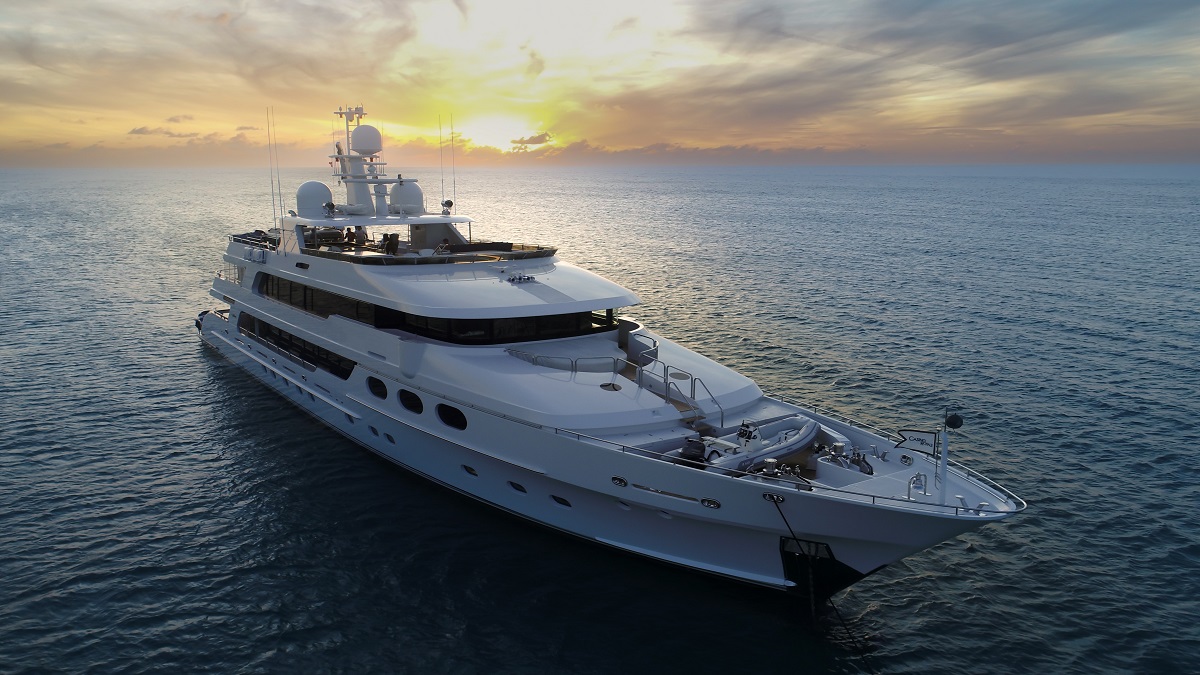
Like any well-run hotel, restaurant, or other luxury service, a crewed yacht needs organized structure and good management. Whether you’re staffing your own luxury vessel or looking for an exciting career working and traveling the world, you need to know how this structure works, and what you can expect to pay or earn and do in the various roles on board.
Every yacht is a little different, and organization may reflect the style of the captain or the demands of the owner. But the same jobs need to be done on almost every boat. Organized with ranks, heads of each division report to the Captain. It’s not a military-style organization, but there are parallels with merchant marine grades and structures.
Smaller yachts need fewer crew, and staff may wear multiple hats that cross more traditional divisions and may combine some jobs with others. Large yachts have more distinct divisions or subdivisions, with more specialization to divide tasks and manage staffing. The core skills are the same, but finding staff with the right blends to do the jobs is key. Crew with broader skills are highly sought after.
As a yacht owner, you shouldn’t have to worry about day-to-day management decisions or organizing all this. That’s why you have a captain, and it’s better to leave staffing decisions entirely up to him or her. But it’s still important to know what it is people you’re hiring do, why they’re there, and how many you need. You don’t want too many crew, or to be short-handed. An understanding of what your yacht needs helps you talk to the captain to keep your yacht running how you want it.
For those looking to break into yacht crew work, consider your skills and strengths, and what jobs appeal to you. You’ll need training before you work, and you can direct your job path through the training you seek. Your goal is a suitable position on a well-run yacht, so make yourself the most attractive candidate possible.
Yacht Work Life
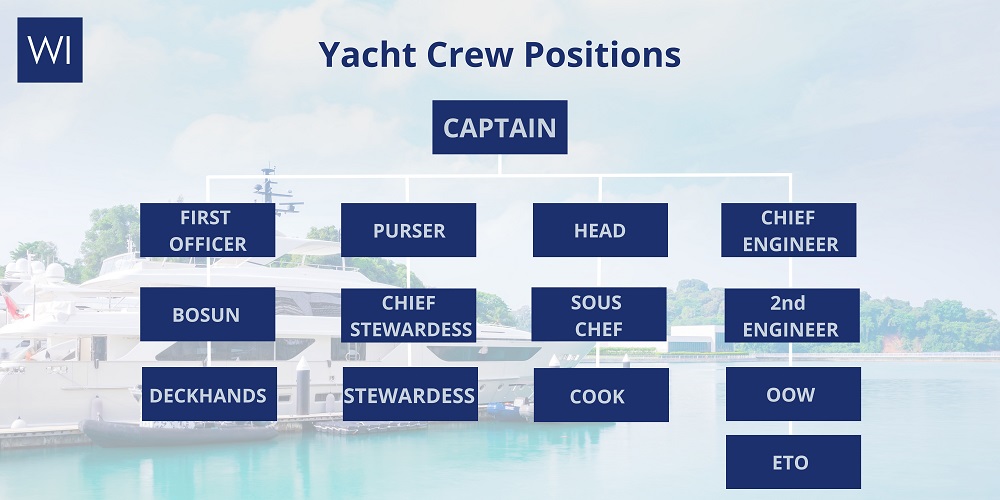
Working on a yacht is also living on the yacht. Crew must have a space to sleep, food, and all the basics that any employee needs. Large yachts have space reserved for crew, and owners looking for quality crew should provide good working and living conditions. Your crew takes care of you, and you should take care of them.
Depending on where a yacht operates or what flag she flies, a variety of labor laws or rules may be in effect. These requirements may be for work visas, contracts and written agreements, and compliance with merchant and ship crew treaties and laws. Be prepared to have work and non-disclosure agreements between yacht and crew, though a few yachts skip this.
Seasonal Jobs
Many yacht positions are seasonal. Year-round employment is more likely for senior crew like the captain and department heads, but not all yachts see year-round use. And some yachts may use different crew in different locales between seasonal moves.
Any job listing should give seasonal information, with geographic information, the length of the season, and the prospects for year-round positions and repeat employment.
Hours, Salaries, and Expectations
Yacht crew is a service job at its core, and every yacht owner is looking for service-oriented people who understand how to deliver a hotel-quality living and restaurant-quality fine dining. Work experience in luxury hotels and restaurants is a big plus for some jobs, and makes breaking into yacht work easier.
Yacht work can be very demanding, with periods of intense work when the owner and guests or a charter party is on board. Long days aren’t uncommon, but often balance with slack time when the boat is empty of passengers. There is always work to be done, but there’s usually a chance for time off.
Most salaries are monthly, since many positions are seasonal. Pay ranges are commensurate with experience, rank, and responsibility. Private vessels usually offer higher base pay, as charter crew can earn tips on top of their base salary. Because of the demands of the lifestyle, compensation is good and you have minimal living expenses on board.
Benefits and Time Off
Because so many jobs are seasonal and may occur in different countries and locations, benefits offered to yacht crew vary widely. But it is not uncommon for crew to be offered health and accident insurance and a flight to the vessel. Living on board, you’ll get food, rooming (usually shared), basic toiletries, uniforms, and laundry. Yachts with a longer view may offer additional training to long-term prospects.
Time off is usually linked to boat use, and may be sporadic in-season or when the boat has the owner and guests on board. There will always be some time off, but it may be between very intense work periods.
Most crew jobs have an employment contract that meets the Maritime Labour Convention 2006 (MLC). This should spell out the contract period and duration, as well as salary, leave and time off, probationary periods, repatriation policies, and any other crucial details to meet the minimum international standards of crew welfare.
This contract should also contain shipboard policies on confidentiality and non-disclosures, drug and alcohol use on board, personal hygiene expectations, interpersonal relationships, and dispute resolution. Job expectations and requirements can also be included, with specific language about roles, tasks, and cooperation between divisions.
Note that all crew agreements will explicitly prohibit drug use on board, most limit alcohol consumption and ban hard liquor on board, and many boats have policies prohibiting intimate personal crew relationships. Because the crew is living on board full time and in close quarters, rules to maintain decorum and crew harmony may be in writing.
Training & Certificates
Two key certifications are required for yacht crew. Employers look for the STCW (Standards of Training, Certification and Watch-keeping for Seafarers) and the ENG1 (Seafarer Medical Certificate). Insurers generally require crew to have these two certifications or the equivalent.
The ENG1 isn’t a class. It’s a medical exam to ensure that the crew is physically fit to serve at sea and has no underlying conditions that may arise far from help. It’s best for prospective crew to secure the ENG1 before investing more time and money training.
STCW is a week-long class on the basics of onboard safety. This includes hands-on modules covering personal survival, fire safety, first aid and CPR, accident prevention, and security awareness. It needs to be refreshed every five years.
Shared, Hybrid, and Crossover Jobs
Larger vessels will have more defined duties and specific areas of responsibility. But smaller yachts may want the crew to have different roles in different situations. For example, a hybrid job description may read “3rd Engineer/Steward” and describe a role in engineering when the boat is empty but on inside crew when passengers are on board.
When hiring or seeking jobs be prepared to look for creative crossover skill sets to meet the needs of the vessel.
Extra Skills and Duties
Any extra skills outside the regular duties makes crew more attractive. From stewards who can teach yoga, give massages or play cocktail piano to deck crew who know how to water ski, SCUBA dive, or fish, anything that crew can bring to enhance the passenger experience adds value to the employee.
If you’re looking for a position, list the skills you’d be comfortable using. If a vessel owner is looking for something specific, spell it out and figure out how that special duty fits into the employee work day.
The Four Main Divisions

Most yacht crews break into four primary divisions which group related tasks and responsibilities together. While the grouping sounds like it’s by section of the boat, they’re really more functional. For example, stewards (Interior) will definitely serve meals, whether they’re in the main dining room or out on deck. Deckhands (deck) are going to be involved in painting, sanding, and varnish jobs anywhere on the boat.
The deck crew handles most of the exterior operations of the yacht, and runs it. Deck hands and crew keep the boat looking clean and shiny, and handling most vessel operations. This includes driving and operating the yacht, navigation, running all launches and ship’s craft, handling lines, and all maintenance and painting, washing, and shining.
2-Interior (or Inside)
Inside crew are primarily the stewards and housekeepers. Larger vessels will have a dedicated housekeeping staff separate from the stewards, but smaller vessels may not.
Stewards keep the interior clean, do all housekeeping, laundry, food and beverage service, cabin preparation, and anything else needed for the comfort of the passengers.
3-Engineering
Below decks, the engineering department ensures the safe and smooth running of all the ship’s machinery and electronics. Engineers are engine and systems specialists, and there will usually be a dedicated electronics expert. Most engineer jobs require professional training and certification.
Fine dining is a hallmark of the yachting experience, and a full-time galley crew prepares all meals for passengers and crew. The head chef plans the menus and provisions the boat, while junior chefs assist the head chef with meal preparation and keeping the galley spotless.
Yacht Job and Department Details
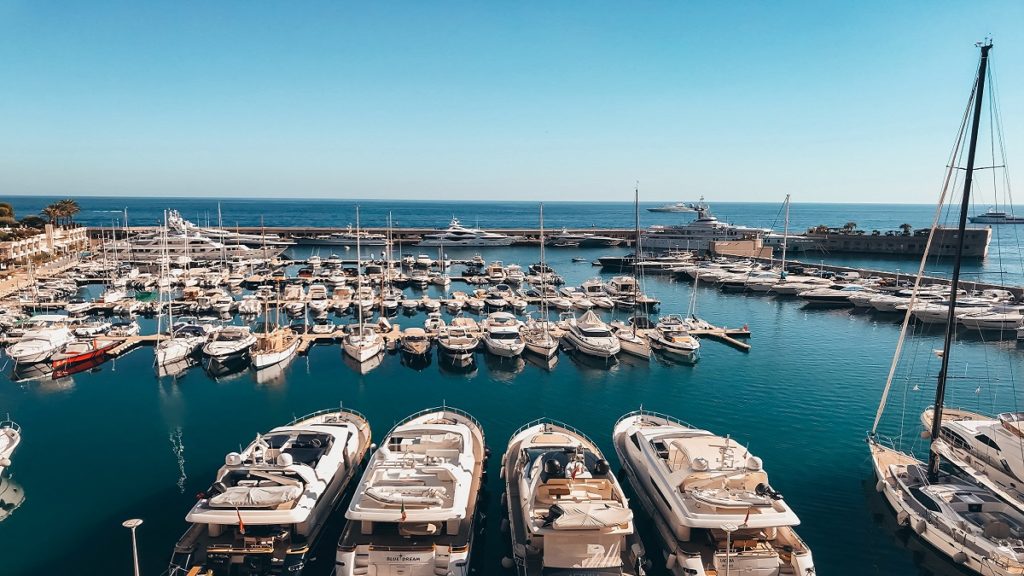
Departments are all organized in a hierarchy, with a department head reporting to the Captain. The clear chain of command makes for smooth operations, with all communications going up and down ranks. Junior staff will occasionally take instructions from other divisions as all crew is expected to help as needed. A captain or department head may organize staff differently, so reporting structures listed are guidelines only.
All salary ranges are monthly figures and are ranges based on yacht size and crew experience. Senior jobs on larger yachts have more responsibility than the same job title on yachts with smaller crews. Experienced crew are very desirable and can expect more pay for their positions.
Listed responsibilities are not exhaustive, and different yachts may allocate some jobs to different positions.
Read also: The yacht charter experience ladder
The Captain

The captain of the vessel is the overall decision maker for the yacht in all situations, including the safety of the vessel. The owner should leave the Captain responsible for operational decisions about hiring and staff and operating the ship. To become a captain requires years of experience and training, and a broad set of skills including yacht operations, personnel management, budgeting and finance. The captain works directly with the owner and owner’s representative, if the captain is not also acting as the representative.
On an organization chart, the Captain is usually placed in the deck division, but the Captain is always the senior-most crew on the yacht and all division heads report to the Captain.
Responsibilities include:
- Responsible for all navigation and running the yacht.
- Senior decision maker on all crew hiring.
- Manage repairs, refits, and yard work.
- Manage budgets and accounting. On larger yachts, this task ends more on the Purser, but the captain is always responsible.
- Ensure all paperwork, clearances, and legal requirements are completed.
- Primary contact with the owner or charter parties.
Reports to: The yacht owner
Salary Range: $6,000 to $22,000
The deckhands handle all the outside responsibilities of the ship, including cleaning and maintenance of the yacht and all the ship’s vessels and toys on board. Deck crew will have significant contact with passengers in this role, operating launches and delivering guests to and from shore and handling the toys.
All deck crew have watch responsibilities on passage, and daily responsibilities keeping the yacht pristine and clean. They will also do line handling and secure the yacht.
Deck department : Chief Mate/First Officer
The Chief Mate or First Officer is the second in command of the vessel, and left in charge when the Captain is not on board. The first mate has the requisite skills to stand in for the captain and run the yacht if needed and usually acts as the division head of the deck team.
The seamanship skills needed are similar to the Captain’s position.
- Primary safety officer for the yacht and all passengers and crew.
- Supervise and manage all operations on deck.
- Bridge watches on passage.
- Passage planning and navigation.
There may be additional mates on larger vessels, these 2nd, 3rd, etc. mates have similar responsibilities on rotation. But the first mate is senior and always second in command.
Reports to: Captain
Salary Range: $4,000 to $9,500 (First mate)
Second and more junior mates may earn $2,000 to $4,000
Deck department : Bosun
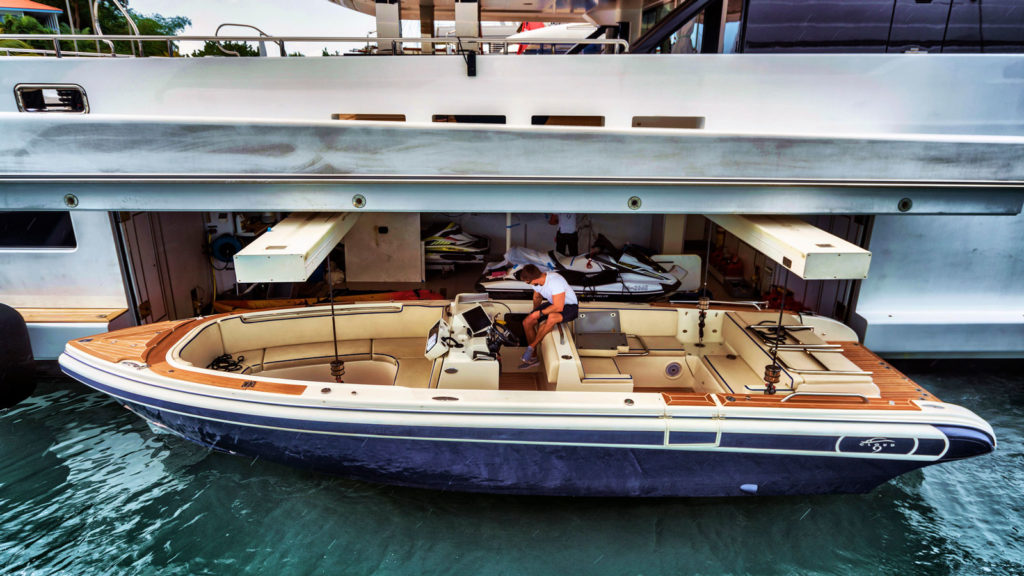
The Bosun is the senior deckhand and manages the junior hands on board. This will usually be the most experienced hand on board.
- Organizing all operations on deck.
- Coordinating the use, storing and launching of the ship’s boats, toys, and equipment.
- Managing the passerelle, watching passenger safety.
- Contact point for guest service on boats, toys, and trips to shore.
Reports to: First mate
Salary Range: $3,000 to $5,000
Deck department : Deckhands
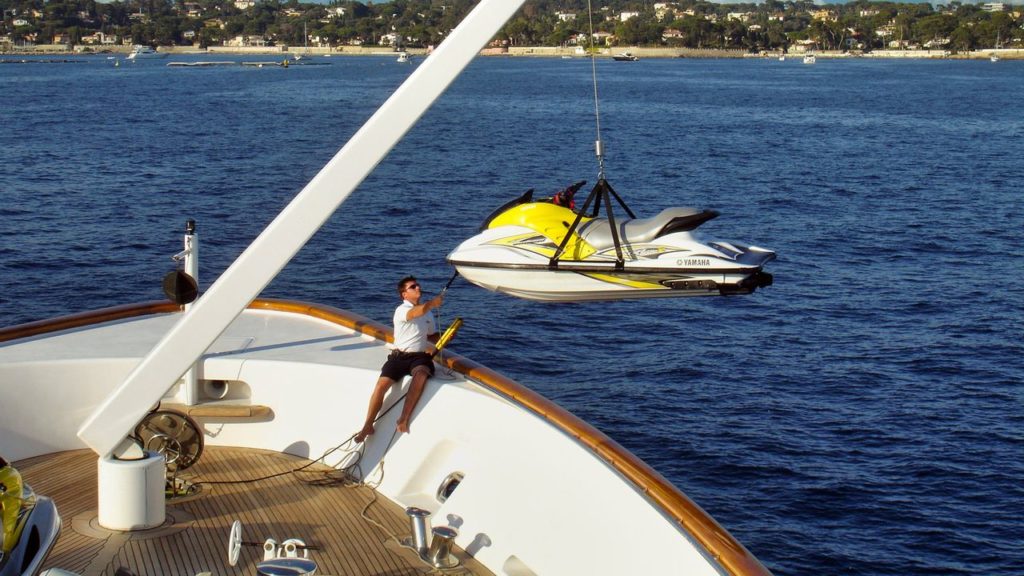
Deckhands are constantly busy with maintenance, cleaning, polishing, and assisting guests as needed. They will assist other departments as needed or given special duties.
- Daily cleaning of the yacht’s exterior.
- Painting, varnishing, polishing.
- Line handling.
- Launching and operating dinghies and tenders.
- Repairs and carpentry.
- Helping guests as needed – everything from handling baggage and gear to embarking and disembarking.
Reports to: Bosun
Salary range: $1,300 to $3,000
Though every position on a yacht is service-oriented, the interior or inside crew provides the primary customer service. They will interact the most with the passengers daily, and they’re directly responsible for the quality of their experience on board.
Interior department : the Purser
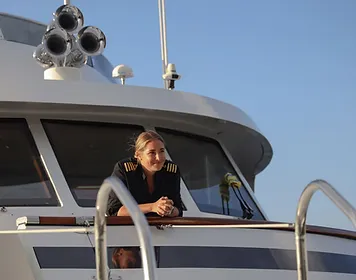
The purser is the chief financial officer of the yacht and handles all the financial operations on board. Accounting, purchasing, payroll and hiring, and all money matters end up with the Purser. This is a senior staff position, and may be the interior department head. Smaller yachts may eliminate the purser’s job and add it to the captain’s and other senior staff duties.
Responsibilities Include:
- Accounting and bookkeeping for all financial transactions.
- Human resources and payroll.
- Handling logistics for all departments related to purchasing.
- Managing contracts.
- Event coordination, including off yacht bookings and payments.
- Primary administration of the boat’s business paperwork.
- Inventory and supply management.
Salary Range: $4,000 to $8,000
Interior department : The Chief Steward/ess

The chief steward or stewardess has primary responsibility for all service roles inside. Food and drink service, cabin preparation, and anything to do with helping the passengers be more comfortable and enjoy their stay. The chief steward will be inside crew with several years of experience.
The chief steward manages the interior staff, setting and enforcing vessel service standards. The chief steward ensures the crew delivers a five-star hospitality experience.
Chief Steward Responsibilities:
- Scheduling and training junior crew for meal and drink service and cabin preparation.
- Primary contact with guests for meals and drinks.
- Sommelier and wine service.
- Coordinate with the galley for meals and presentation.
- Decorate the interior, from flower arrangement to table settings.
- Arrange onshore activities and outings.
Reports to: Captain or Purser, depending on the yacht
Salary Range: $4,000 to $8,500
Stewards/Stewardesses
The stewards and stewardesses are the primary guest service staff. They will work closely with guests and passengers, and have daily contact with them as they meet most of their needs while on board.
Steward Responsibilities:
- Food and drink service.
- Room preparation and turndown service.
- Cleaning, polishing, housekeeping, and inside maintenance.
- Cabin detailing.
- Laundry, pressing, and folding.
- Help with outings, trips, debarkations.
Reports to: Chief Steward
Salary Range: $1,500 to $4,500
Housekeeping

Larger yachts may have a dedicated housekeeping and laundry staff. This will be part of the inside crew, under either the purser or the head steward. There may be a senior housekeeper, if there are more than one housekeeping crew on board.
Responsibilities are the cleaning and laundry portions of the steward’s job, and a laundry steward may spend most of her time inside the ship’s laundry.
An experienced Head of Housekeeping may earn from $4,500 to $7,000, while a Laundry Steward typically earns from $2,500 to $3,500.
Read also: CAN OWNING A YACHT TO CHARTER (REALLY) BE PROFITABLE?
Food service requirements on any yacht are high. Whether it’s a privately owned vessel or a charter, the expectations are always for top tier food service, with a variety of meals planned for the requirements of every passenger. Chefs and cooks prepare all meals on board for passengers and crew, but sometimes other interior crew may help with prep work or cleanup.
Smaller yachts have smaller galley crews, but the largest vessels may have an executive chef and several sous chefs. All chef positions require formal culinary training and experience, but cook positions are often entry level. Promotion from cook to chef is unusual without additional training.
Galley department : the Head / Executive Chef

On larger yachts, an Executive Chef will run the entire galley with the help of sous chefs and cooks. With an Executive Chef, there’s an expectation that the food and menus will be on a level with Michelin star-rated restaurants.
The executive chef brings a thorough understanding of food preparation and presentation, and moves food preparation past creative up to artistic. Job responsibilities are similar to a chef, but the job demands and the required experience and education are much higher.
Salary range: $7,000 to $11,000
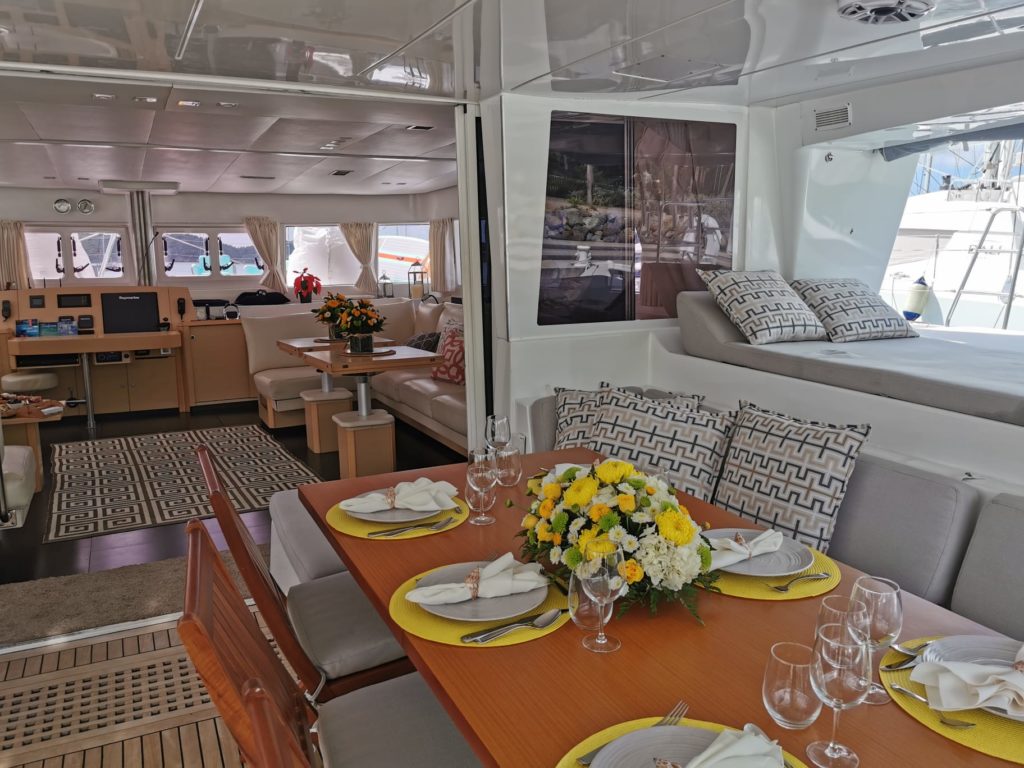
The chef has overall responsibility for all meals on the yacht, from provisioning in remote places to hygiene and good safety. If there’s only one chef, she’s the head of the galley crew. Finding the best provisions in far away locations and making the best of local food availability is a major part of the job.
- Planning a delicious and varied menu for passengers.
- Sourcing all food and arranging transport to the yacht.
- Maintaining and operating within the galley budget.
- Preparing passenger meals with professional presentation and style.
- Cleaning and maintaining galley and galley equipment.
- Deliver menus and meals on time, while running an organized and spotless galley.
Galley department : Sous Chef
The sous chefs assist the chef in all aspects of running the galley, and may have independent assignments to plan and guest and crew meals. While not primarily responsible for provisioning, the sous chef will help with food selection, menu preparation, and planning. A sous chef must have formal culinary training.
Reports to: Head chef
Salary Range: $3,500 – $6,000.

Galley department : The Cook
Cooks may be entry-level positions or experienced, but do not require formal gastronomy education. They will assist the chef and sous chefs, cooking meals and dishes for guests and crew, helping with provisioning, and keeping the galley neat.
- Assist with provisioning and buying high-quality food from local sources.
- Follow all food handling and safety guidelines.
- Assist the head chef as needed, taking direction and guidance.
- Prepare guest and crew meals as required.
- Staying on top of galley inventories and supplies.
Salary Range: $2,500 to $3,500
Engineering

The engineering department keeps the yacht and all its systems working. Whether it’s the engines, electronics, air conditioning, or the plumbing – it’s up to engineering to keep it running.
There is considerable overlap with commercial shipping in the engineering field, as many of the same skills apply. And there is a broader range of qualifications and grades based on the size and power of the vessel. Job ratings may be set by required experience based on tonnage of ship or power of engines, with corresponding levels of pay and responsibility.
Unlike commercial shipping, engineers may get involved in other aspects of running the yacht, like helping with docking and water sports with mechanical toys.
Engineering certifications, training, ratings, experience and licensing are critical to hiring competent engineers, and for engineering crew it’s an important facet of career advancement. This is important for Chief and 2nd Engineers, which are often broken out by MCA (U.K. Maritime and Coastguard Agency) rating or other international equivalent.
MCA ratings for engineers Commercial and Private Yachts over 24m are:
Y4: Less than 200 Gross Tons and less than 1,500 kW engine power Y3: Less than 500 GT and 3,000 kW Y2: Less than 3,000 GT and 3,000 kW Y1: Less than 3,000 GT and 9,000 kW
There is also an unlimited rating for merchant vessels larger than the Y1 category. For discussing salary and responsibilities, we will include all ratings in one position description, but pay scales with the size of the yacht and any required higher ratings.
Chief Engineer
The chief engineer manages all aspects of keeping the yacht and its systems running. The chief engineer manages all the engineering staff, and directs all maintenance, repairs, troubleshooting and upgrades. This is a management position, but requires extensive hands-on technical experience and knowledge. Chief engineers on large yachts hold an MCA Y1 or Y2, smaller boats will have a lower rated chief and a smaller staff. Check Jooble.org to find abroad marine engineer vacancies.
- Provisioning, shopping, and stocking.
- Preparing passenger and crew meals.
- Following instructions and cooking under the direction of others.
- Galley cleaning.
- Follow food safety and storage procedures.
- Food pre-preparation.
Salary Range: $6,000 to $15,000
2nd Engineer
The second engineer is also a highly skilled position requiring a rating or license and several years of experience. This senior level engineer also needs knowledge of how to troubleshoot and maintain all yacht systems.
- Maintain and manage all engineering operations.
- Hire, train and supervise all engineers.
- Project manage all upgrades and retrofits, including managing budgets, contracts, and suppliers.
- Coordinate maintenance schedule for the entire yacht around the usage and seasonal schedules.
- Maintain costs and accounting for engineering operations.
- Design and handle all safety operations.
- Set and maintain standards for operations and cleanliness in the engine room.
Reports to: Chief engineer
Salary Range: $5,500 – $10,000
OOW (Officer of the Watch) Engineer
The OOW is a junior engineering position, but still licensed. There are two categories of OOW – MEOL (Marine Engine Operator License) and the more junior AEC (Assistant Engine Course). The overall responsibilities are similar, working to support the senior engineers and handle independent assignments. The AEC rating is entry level for licensed crew, but has training and certification.
- Support the chief in all projects.
- Maintain a clean, safe engine room.
- Perform all maintenance, troubleshooting and repair tasks as needed.
- Support motorized water sports.
- Occasionally assist with other vessel operations, like line handling.
Reports to: Chief Engineer
Salary Range, MEOL: $4,500 to $6,000 Salary Range, AEC: $2,500 to $3,500
Electronics/Technology Officer (ETO)
The ETO takes responsibility for all audio-visual and information technology on board. Ensuring passengers have access to the internet, movies, television, and music is a primary responsibility. This position carries a fair amount of passenger interaction, and an ETO needs good troubleshooting skills to go with customer service skills.
- Ensure all audio/visual and entertainment systems are always available for passengers.
- Assist passengers with personal technology and ship systems as needed.
- Conduct regular maintenance and upgrades of the network, information, and A/V systems around passenger schedules.
- Assist other engineers as needed, especially with electronic systems.
- Contribute as needed with other departments for boat and passenger operations.
Salary Range: $4,000 to $9,000
Junior Engineer
This is a lower or entry level position for someone with engineering skills but without formal licensing or certification. The junior engineer will help with safety and cleanliness, and assist in any engineering tasks as needed. The ability to solve problems and fix things opens this spot for anyone capable and willing to do the job.
- Help with cleaning, maintenance, and safety functions.
- Help anywhere needed on the yacht.
- Assist senior engineers as needed, taking direction and following instructions exactly.
- Constantly develop skills.
Read also: IS BUYING A BOAT A BAD IDEA?
Whether you are a yacht owner or considering entering this dynamic industry with an established and reliable crew, it is essential to have an understanding of the yacht’s hierarchical structure, mission priorities, and salary expectations. By doing your research on the complexity of yachting before hiring your team, you can confidently select the right group of experienced and qualified professionals for your needs. Staying up-to-date on top industry trends and knowing the capabilities of each type of yacht crew position will enable you to make sound decisions that support a safe and cost-effective journey. With quality personnel at your helm, you can cruise unhindered in luxury and explore new destinations with peace of mind.
Fractional Yacht Ownership : Everything you Need to Know
What is the best country to register your yacht offshore, you might also like.
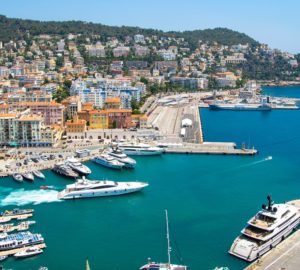
What differentiates a yacht from a superyacht or a mega yacht?
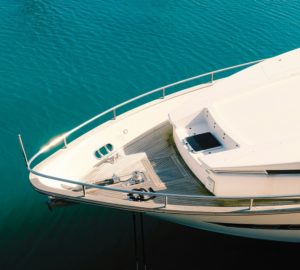
Chartering Requirements and Regulations: A Guide for Boat Owners

What are the Fastest Cruising Catamaran on the Market?

- Career Advice
- Salary Guide
- Dockwalk Presents
- Digital Dockwalk
2023/2024 Superyacht Crew Salary Guide

Whether you’re continuing a long-standing career, climbing the career ladder, or getting your feet wet for the first time, Dockwalk ’s Salary Guide provides the full picture when it comes to crew compensation.
Salary is generally one of the top motivators for those looking for jobs in yachting, but it remains a closely guarded secret. Each year, the Dockwalk Salary Survey goes out to thousands of crewmembers and crew agencies across the world, gathering real-time salary feedback with the aim of creating greater transparency and understanding across the industry.
The 2024 Salary Survey is now closed. Check out the results in the September 2024 issue.
The Results of the 2023 Salary Survey
Our annual salary survey provided some unprecedented insights to what captains and crew earned in 2023.
The yachting industry is slowly returning to normal in the wake of the pandemic. Yachts are back to work around the world and many new ones are in the pipeline thanks to the surge in popularity the "social distant" yachting lifestyle has enjoyed. But, while this return to normalcy has opened up new crew jobs this year, crew themselves have been returning to the workplace in large numbers and competition has been fierce.
Many of the crew agents reported that crew wages largely are flat this year compared to last. Salaries went up in 2021 and 2022 when crew were in short supply, but now more crew are available than previously. While crew are demanding higher pay this year, they’re not necessarily receiving it, but some agents have seen salaries continue to rise since Covid. There are many factors that can affect the salary crew can expect, including where a yacht is based and the season.
The tables below show the “agency range,” which gives the average lows and highs of all ranges provided by the agencies, the “poll range,” where results from individual working captains and crew are tallied to show the lowest and highest of all the responses, and the “poll average” calculated from all the responses. Note that our figures do not account for longevity and experience, crew benefit packages, tips, or similar extra remuneration.
Not all positions with corresponding boat sizes had enough poll responses to be considered significant; those categories are marked with an asterisk to indicate if fewer than five crew responded in that size range for that position. Several categories had no or only one response, which is also noted.
To view the full table:
Dockwalk Salary Survey 2023 in USD and Euros

Yacht Crew Salaries By Position
Ever wondered what staff members aboard a luxury yacht charter make? Here’s a breakdown by position. Some may surprise you.
If you have ever binge-watched Below Deck, or daydreamed about working on a luxury yacht, you may have thought to yourself, “I wonder what they make?”. Many people across the world have jumped at the opportunity to rub elbows with the world’s elite while working aboard the most luxurious ships in the world.
If you have wondered what the salaries are for workers on a yacht, and want to take the next step toward a great mix of freedom and pay, joining a luxury yacht crew might be for you.
Crew jobs on yachts can be some of the most rewarding careers available, but they are also challenging. It is important to know what to expect when applying for a crew job. Here is a breakdown of what you can expect to find when applying for a yacht crew job.
Yacht Staff Departments
To understand the yacht crew job descriptions better, you have to understand the different departments in a yacht. These departments include:
- Deck – passage delivery, safety, outdoor guest activities, and exterior maintenance.
- Interior – guest wellbeing, housekeeping, accounting, activities.
- Engineering – smooth running of the yacht and safety.
- Galley – stock control, hygiene, food preparation, galley maintenance.
On any yacht, the captain is at the top of the hierarchy. They are responsible for reporting to the vessel’s owner via a representative or directly. Below are the job descriptions for yacht crew members in these departments.
Salaries will vary depending on the size, type, location, and use of the yacht. The crew’s experience and qualifications will also play a role in determining their salary.
Deck Department Roles
The captain’s job description includes: keeping the vessel safe and secure, ensuring that all crew members are doing their job, and reporting any safety concerns. Typically, this person will also be in charge of hiring other deck officers for specific duties. Depending on various factors, the captain could be paid $4,200 to $15,800 per month.
Although this an extremely high pay rate, it requires decades of experience typically. Being in charge of the safety of passengers, crew members and potentially a $50 million yacht is serious business!
Chief Officer/First Mate
Chief officers’ responsibilities include supervising the crew’s daily activities, maintaining duties and duties lists, and overseeing crew pay. This is also the person who will be in charge of hiring other crew members and managing the activities or watersports the guests would like to participate in. Typically, this person will make around $3,100 to $14,200 per month.
Second Mate
The second mate’s job description includes: being in charge of navigating the yacht and overseeing any repairs that may be needed. Typically, this person will make around $3,100 to $8,400 per month.
The third mate’s responsibilities include: handling deck chores and maintenance for the yacht. The salary is $2,600 to $6,300 monthly.
A bosun is in charge of safety and security, supervising diving operations and monitoring all deck equipment. They will also maintain the diving records whenever necessary. This person will make around $2,600 to $6,300 monthly.
Interior Department
A purser is responsible for hiring, training, and caring for all crew members. They are sent out to find candidates and supervise their performance in port and during sea trips. They are responsible for every operation in this department. Typical salaries go from $5,200 to $9,400 monthly.
Chief Steward
The chief steward is responsible for hiring, training, and supervising all crew members in the interior department. They will set up work schedules, determine pay scales and enforce penalties if they are not followed. Typical salaries go from $4,800 to $8,800 monthly.
The steward is in charge of the kitchen, taking orders and keeping track of all supplies. They unpack and pack the guest’s luggage and remain on standby at all times in case anything happens. Salaries go from $3,100 to $6,800 monthly.
Engineering Positions
Chief engineer.
He or she is in charge of the engine room and is responsible for ensuring it is operating smoothly. The chief engineer is responsible for providing services to all the other positions on board if needed. They will make around $6,300 to $15,600 monthly.
Second Engineer
As the second in command to the chief engineer, this person will be in charge of all engine room duties and services that need to be done. Salaries are typically around $3,200 to $10,500 per month.
ETO Officer
An ETO officer will oversee all electrical and electronic equipment, including everything from the GPS to the yacht’s peripheral devices, lighting, and communications equipment.
They will be in charge of setting up the systems, testing them during repairs, checking their functionality, and identifying any problems. Salaries are around $4,300 to $8,500 monthly.
Galley Positions
The head chef is in charge of all the food preparation and storage. All food preparation is under the direction of this chef. They are trained professionals who ensure that strict hygiene standards and food safety are maintained. Salaries go from $6,300 to $10,500 monthly.
The sous chef is in charge of food preparation and operations and preparing all menus at the direction of the head chef. They prepare, cook, and serve all food items that the guests require while on board. Salaries go from $3,700 to $8,400 monthly.
Galley Staff
There is a galley staff who works in the galley. Galley staff will be responsible for washing dishes, cooking, cleaning, serving food, and preparing daily menus. Salaries go from $2,500 to $4,300 monthly.
The Bottom Line
This article covers the yacht crew job descriptions for various jobs on the yacht and their salaries. As you plan to secure a job in the yacht crew industry, ensure you know everything you need to about the job. What will be the working hours? Will there be leaves to travel home? You must be prepared before applying for any of these jobs on a yacht charter .
One thing to note is that some ormost of these positions aren’t available on all yacht charters. This will depend on a number of factors including the numbere of guests, size of the yacht, budget of the guests and location of the yacht.
Being a member of a yacht crew is both flexible and very strict at the same time. Your level of service and professionalism are critical to ensuring the esteemed guests have an experience they expect for shelling out tens of thousands of dollars. So, expect very strict rules while on board.
To learn even more about renting a yacht in San Diego, please visit our articles page!
Essential Guides
Ocean Mapping
New to Yachting
- Apr 13, 2023
YPI CREW, a leading yacht crew recruitment company, has released its 2023 Yacht Crew Salaries Report following a positive and fast-paced year in yacht crew placement. The report outlines trends in the industry and emphasizes the importance of flexibility in attracting top talent.
2022 marked a significant shift in the yachting industry, as the effects of Covid-19 began to wane. One key trend that emerged was the extension of scheduled or rotational leave to positions outside of the engine room and the bridge. Crew members are increasingly focused on achieving a harmonious work-life balance, leading yachts to adapt their leave packages to remain competitive. Flexibility with regards to leave has become a key factor for all departments and allows for a larger pool of candidates who are fully committed to the yacht, its programme and owner.
Read the full Yacht Crew Salary Report HERE .

Both the Deck/Bosun's and the Interior/Galley Departments have witnessed a steady trend towards increased leave packages. Senior Stews, for example, now seek a minimum of 90 days leave, and 95% of Chief Stews look for full rotation. Stew Head of Departments have come to realize the benefits of scheduled or rotational leave, a perk that was once reserved for Engineers or Officer/Captains Departments. Additionally, and in order to compete with the larger yachts, an important number of yachts under 70metres are now also considering increased leave packages to secure top crew. It's important to note that the salaries listed in the report are median range salaries and can vary based on factors such as job-specific skills, professional qualifications, and experience.
YPI CREW now offers a bespoke service for our yacht clients to assist with salary reviews and comparative analysis. Contact Chloe Collet at [email protected] for any further information.

Most read articles

Tips & Tricks
How many crew members are needed on a yacht?

How to Find A Caribbean Yacht Job

Yacht Job Offers
Open Yacht Crew Jobs In April 2024

Industry News
Is a career in the yachting industry a good fit for me?

YACHT CREW GUIDES
IS YACHTING THE RIGHT CHOICE FOR ME?
Essential yacht guides

Mandatory certificates

What you need to know about B1/B2 visa

How to prepare for a yacht interview?
Read more latest news

Olympic Grit and Resilience: What Yacht Crew Can Learn from Elite Athletes

YPI CREW Announces its 2024 Superyacht Recruitment Market Report

Mind the Gaps: How to Explain Employment Breaks on Your Yacht Crew CV

YPI CREW Releases 2023 Yacht Crew Salaries Report
INDUSTRY NEWS

HOW TO WRITE A MEMORABLE YACHTING CV

YACHT CREW SALARY GUIDE
Error 404 — page not found, we’re sorry, we couldn’t find what you were looking for.
Please return to the YPI CREW homepage
Let’s get started. Call us on +33 (0)4 92 90 46 10 or email us.
Our mission, vision and values, mlc 2006 compliance, essential guides, yacht crew positions.
Chief Officer
Second Officer
Third Officer
Chief Engineer
Interior Crew
Head of Service
Head of Housekeeping
Specialist Positions
Spa Manager
Spa Therapist
Personal Trainer & Yoga Instructor
Hairdresser
Mandatory Certificates
B1/b2 visa information, how to write a memorable cv, how to prepare for an interview, yachting seasons, yacht crew salary guide, is yachting the right choice for me, cv templates, ocean mapping, new to yachting.
+33 (0)4 92 90 46 10
The Ultimate Guide to Yacht Crew Salaries
- by yachtman
- September 16, 2023 June 22, 2024

Yacht crew salaries – a topic of intrigue for many. If you’re asking yourself how much these professionals make, this guide is for you. Here, you’ll find all you need to know about yacht crew salaries.
Factors like the size and type of the yacht, its location and cruising itinerary, all influence pay rates. Moreover, experience and qualifications of the crew matter too when it comes to yacht crew taxation .
In addition to the usual suspects, there are other unique details to yacht crew salaries. For example, some yachts reward their crew for excellent service or guest feedback. So hard work can bring you more than just a base salary.
Let me share a true story. Sarah is a highly experienced chef aboard a luxury superyacht in the Mediterranean. With her culinary skills and extensive training, Sarah earns a salary that reflects her expertise and talent.
Yacht crew salaries are a complex mix of vessel type, location, qualifications, and performance-based rewards. By exploring this guide, you’ll gain valuable insights into this fascinating aspect of the yachting industry . Let’s get started!
Understanding the yacht crew salary structure
Salary structure for yacht crew is key to understand when wanting a career in the yachting industry. See the following breakdown of positions and their corresponding average monthly salaries:
| Position | Monthly Salary (Average) |
|---|---|
| Captain | $10,000 – $20,000 |
| First Officer | $6,000 – $12,000 |
| Chief Engineer | $8,000 – $15,000 |
| Deckhand | $3,000 – $5,000 |
| Steward/ess | $3,500 – $6,500 |
| Chef | $4,500 – $10,000 |
Aside from these positions, experience, qualifications and yacht size can affect salaries. Gratuities can boost earnings too.
It’s important to be aware of trends when it comes to salary structure. Demand for experienced crew has been growing due to luxury yacht vacations. Salaries have also been rising.
It’s essential to know the yacht crew salary structure if you want to pursue a career in the yachting industry. Knowing average salaries and keeping up with trends will help you make smart career decisions.
Factors that influence yacht crew salaries
Various factors impact yacht crew salaries, like experience, job position, and yacht size/type . Experience enhances earning potential, while captains/engineers earn more than deckhands/stewards. Larger yachts often offer higher wages, and yacht type impacts specialized skills compensation. Certifications, language proficiency, and additional skills also factor in. According to SuperYachtTimes, certain destinations offer more competitive remuneration packages due to market demands and living costs variations. When considering a career in this field, take these factors into account to shape your earning potential.
How to negotiate yacht crew salaries
Here’s a guide to help you negotiate yacht crew salaries and get the best pay package:
- Do Research : Learn the industry standards for yacht crew salaries. Look into job roles, experience levels, and vessel types to set a benchmark.
- Assess Yourself: See how your skills, qualifications, and experience compare to other crew. Show any special strengths or certifications that could get you a higher salary.
- Get Ready to Negotiate: Prepare evidence for your desired salary range. Be ready to show your successes, awards, and extra value.
- Pick the Right Time: Time is key when negotiating salaries. Look for moments when your employer is okay with it, like during reviews or contract renewals.
- Show Your Case: During talks, explain why your salary should be higher, but stay professional and respectful. Highlight how you’ve helped the team or operations.
- Look at Non-Financial Benefits: If a raise isn’t possible now, try longer vacations, better housing, or professional development to boost your package.
Remember, negotiation is an art and needs both parties’ needs and expectations. By following these steps and customizing them to you, you’ll ace salary talks with confidence.
Pro Tip: Stay open to compromise, but aim higher than your target salary range to have some room to move without undervaluing yourself.
Expected salary ranges for different yacht crew positions
Salaries for yacht crew members vary greatly , depending on their position and experience. Here’s a look at the expected salary range for different roles in the yacht industry:
| Position | Min. Salary/Month | Max. Salary/Month |
|---|---|---|
| Captain | $8K | $25K |
| Chief Officer | $5.5K | $12K |
| Chief Engineer | $6K | $15K |
| Chef | $4K | $10K |
| Steward/ess | $2.5K | $6K |
| Deckhand | $2K | $5.5K |
Note: These figures are estimates, and can change due to yacht size/type, location, and individual skills/certs.
In the yachting industry, it is essential to be aware of the ultimate guide to yacht crew recruitment agencies to navigate the industry effectively.
To increase earning potential, get specialized training/certs related to your role. Qualifications make you more appealing to employers. Network within the industry. Go to events and join pro orgs – meeting people who can give valuable connections. Building relationships with captains/brokers can get you better jobs with higher salaries.
Maintain professionalism and dedication at work. Yacht owners value crew members who show reliability and hard work. Going above and beyond can help you stand out when it’s time for promotions/salary negotiations.
By following these tips and investing in your skills/network, you can make the most of the yacht industry.
Tips for career advancement and higher salaries in the yacht industry
Seek out chances to advance your career, such as going to industry conferences or getting certifications. Make connections with important members of the yacht industry, both on and offline. Doing this can give you access to job openings and mentors. Show off your skills through a resume and cover letter when applying for jobs. Showcase experiences and accomplishments that will make you attractive to employers. Be open to taking on different jobs or tasks to get varied experience and make yourself more marketable.
In addition, stay informed about current industry trends. Find out about new tech, regulations, and best practices. This way, you’ll be seen as an invaluable asset to the yacht industry.
As an example, Sarah started as an entry-level stewardess but quickly rose through the ranks. She was recognized by her co-workers and bosses. In a few years, Sarah became chief stewardess on a top yacht. She was successful due to her excellent skills and adaptability. Now, Sarah earns higher salaries and has more opportunities for career advancement.
By following these tips, as well as being determined and hardworking, you can enhance your career prospects in the yacht industry and make more money.
Analysis of yacht crew salaries shows insights, both for inexperienced and experienced crew members. High demand for yachting professionals has created competitive compensation packages, plus yearly increments and benefits like accommodation, travel allowance, and food. Salary structures vary based on factors like experience level, yacht size/type, job role, and location.
It is vital to look at certifications and specialized skills for understanding crew members’ earning potential. Get additional qualifications like STCW certificates or culinary training to increase the chances of getting higher-paying jobs. Positions like diving instructors or onboard beauty therapists come with attractive remuneration packages.
To not miss out on great opportunities, stay up to date with industry trends. Network with fellow professionals through conferences or online platforms. By staying connected and informed, you can maximize your earning potential .
Frequently Asked Questions
FAQ 1: What factors determine yacht crew salaries?
Answer: Yacht crew salaries are determined by various factors such as experience, position, size and type of yacht, level of qualification, location, and the owner’s budget.
FAQ 2: What are the typical positions and salary ranges in the yacht industry? Learn more in the essential guide to yacht crew placement .
Answer: Typical positions in the yacht industry include captain, first mate, chef, stewardess, and deckhand. Salaries can vary significantly, with captains earning $80,000 to over $200,000 per year, while deckhands may earn $30,000 to $50,000 per year, depending on experience and other factors.
FAQ 3: Are there any additional factors that can affect yacht crew salaries?
Answer: Yes, additional factors can include bonuses, tips, benefits, overtime pay, and the length of the working season. These factors can significantly impact the overall salary package for yacht crew members.
FAQ 4: Are there opportunities for career advancement and salary growth in the yacht industry?
Answer: Absolutely! Yacht crew members can advance their careers and increase their salaries by gaining additional qualifications and experience. Progressing to higher positions such as chief stewardess or captain can lead to higher income and better job prospects.
FAQ 5: Do yacht crew members receive any additional benefits besides their salaries?
Answer: Yes, besides their salaries, yacht crew members often receive additional benefits such as free accommodation and meals onboard, health insurance, retirement plans, transportation allowance, and the opportunity to travel to exotic locations.
FAQ 6: How can I find accurate and up-to-date information about yacht crew training programs ?
Answer: It is recommended to consult reliable sources such as industry publications, yacht crew agencies, and professional associations specializing in the yacht industry. They can provide accurate and up-to-date information on yacht crew accommodations .
Leave a Reply Cancel reply
Your email address will not be published. Required fields are marked *
Save my name, email, and website in this browser for the next time I comment.
Superyacht Crew Salaries: First Report Released
- Inspiration
Related News
Popular news this week, popular news this month, latest news.
- Yacht Charter & Superyacht News >
Written by Maria Korotaeva
Many life-long careers in the yachting industry have begun as a seasonal job or gap year with a desire to visit exotic destinations. The continual change and challenges that come with each new charter group make the positive feedback even more satisfying and those with lifelong wanderlust have a rare opportunity to see some of the world’s most incredible cities and scenery .
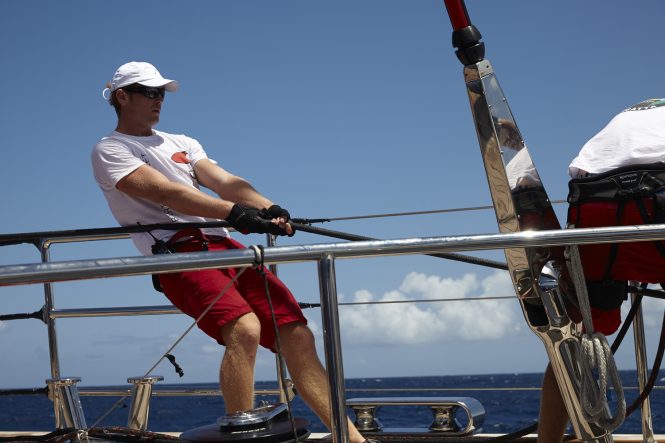
Seahwak’s Crew
Working on a luxury yacht isn’t without its drawbacks, however: Weeks at a time spent away from home, long working hours in the peak seasons and ensuring that everything runs smoothly when you’re far from the port can all take their toll. When performing tasks that can be as equally trying as they are rewarding, crew members want to assure that their pay reflects the professionalism and high degree of detail that they put into each day.
Following the launch of free salary-sharing platform www.yachtingsalaries.com in March 2016, YPI CREW has revealed its first report into the salaries paid to the crew on luxury yachts of various sizes.
Covering the period between 2016/2017, the results not only provide transparency to crew members but help employers to attract and retain individuals with exceptional skills. The occupations covered range from captains to deckhands and compare pay for permanent, private, rotation and charter crew: Find out how the charter industry measures up to the other sectors.
446 captains submitted information to www.yachtingsalaries.com, and the data revealed that 13% worked on sailing yachts and the other 83% on motor yachts. Captains on larger yachts earned more per month than captains of smaller vessels to create an upward trend, although M/Y captains of 35m-51m superyachts fared particularly well, with a jump in salary from €9,000 per month for 41m-50m yachts up to €13,000 p/m for larger luxury yachts. Private and permanent captains tended to earn the most for their size category, with permanent captains coming out slightly ahead.
Sailing yacht captains tended to earn the same as on motor yachts for the 0-35m and 35-40m vessels, earned more than motor yacht captains in the 41-50m category by €2,000 per month, and earned less than motor yacht captains by €2,000 in the 51-65m category.
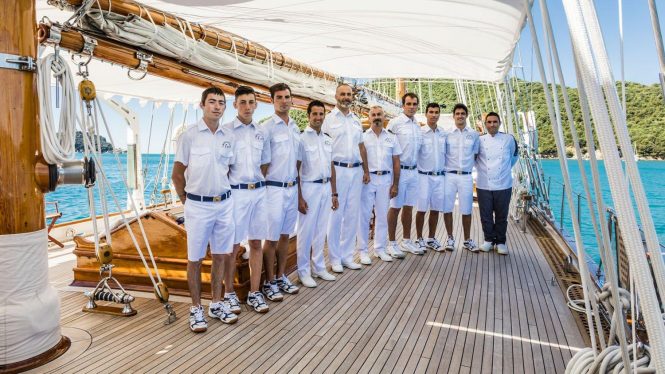
Crew aboard Crose Del Sud
Technical Crew
239 of the 434 technical crew surveyed were chief engineers, and on charter yachts, they earned an excellent salary compared to private, permanent and rotational counterparts on the same-sized yacht: In the 0-35m size category, they earned €6,000 per month compared to €5,500. Salary levelled off in the 80-100m category, with chief engineers on charters earning slightly less than others with a salary of €9,500.
Second engineers were the most stable across the sectors and received a steady pay of between €48,000, rising to €70,000 on the largest yachts. Second engineers on charter yachts were paid considerably more per month than permanent and private second engineers within the 51-65m and 66-80m categories, earning between €5,000-€10,000 more in the former category and €2,000-€5,000 per month more in the latter.
Third engineers earned between €2,500 and €5,000 per month, with the pay scale raising incrementally based on yacht size.
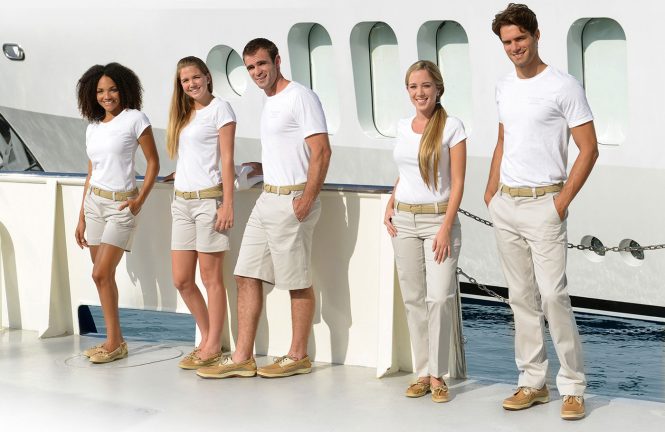
Luxury superyacht crew
Deck officers
69% of the 224 deck officers who took part in the survey were permanent and 31% rotational. Second and third officers had a greater chance of occupying a rotational position (50% and 70%), making deck officers the most likely crew members to have rotational work. Deck officers on charter yachts tended to earn less than counterparts on similarly-sized vessels, and private and permanent positions provide the most stable throughout.
Salaries for chief officers on charter yachts ranged from under €4,000 per month on 0-35m vessels to over €8,000 on 81-100m vessels and dropping slightly in the category of 101+m
Data for 2nd and 3rd officers was more sporadic, and charter position salaries ranged from €3,800 for both positions on yachts 51-65m and upwards.
Although 127 chefs participated in the survey, results were varied both for yacht sizes and sectors, producing the unusual graph where the head chefs on a 0-35m and 66-80m yacht were earning approximately the same (€4,000 per month) while on other sized charter yachts the head chefs were earning between €5,000 and €8,000. Of the head chefs who submitted data. 85% were permanent and 15% on rotation.

Dining aboard superyacht SuRi
Vessel size seemed to play a part in the salary of sous chefs, with each type of employees earning more on larger yachts. 71% were permanent, and 29% were temporary.

Pursers, Stewards and Stewardesses
For the 2016/2017 report, only 27 pursers, 68 chief stewards/stewardesses and 27-second stewards/stewardesses provided information, and there are therefore too few results to make solid conclusions about industry salaries in this area. Of the pursers, salary varies from €5,000 per month to €7,000 and remuneration did not have any correlation with the size of the yacht and salary was stable regardless of the type of employment, although results were the most unstable in the 66-80m category.

Excellent service onboard
Chief stewards and stewardesses received greater salaries for working on larger yachts, with rotation, permanent and private employment having the most stable salaries and charter crew the most variable: salary on a 51-65m superyacht was €6,500 per month, whereas under €6,000 was paid to stewards and stewardesses aboard 66-80m vessels and smaller yachts.
The results of the second stewards and stewardesses had the most variability, with charter and rotation crew earning under €3,000 for 66-80m vessels while private and permanent crew earned €5,000.
Deckhands
Deckhand salaries tended not to vary depending on the size of the vessel, and 93% were permanent and 7% on rotation aboard motor yachts, while sailing yachts had 100%, permanent crew. From the 87 deckhands that contributed to the study, data revealed that salaries tended to range between €2,100 – €3,000 per month, regardless of whether the yacht was a charter, private or permanent. Deckhands on rotation earned €3,000-€9,000 less depending on the size of the yacht.
The website www.yachtingsalaries.com currently has 2,857 searchable salaries and includes other professions such as bosun and helicopter pilot, as well as the full comprehensive report. Results are searchable at any time, and the next report is due in November 2018.
Please contact CharterWorld - the luxury yacht charter specialist - for more on superyacht news item "Superyacht Crew Salaries: First Report Released ".
- Charity & Fund Raising
- CharterWorld News
- Classic Yachts
- Coronavirus
- Cruise Ship
- Ecological Yachts
- Expedition Yachts
- Expert Broker Advice
- Feature Superyachts
- Interior Design
- Legal & VAT Yacht Issues
- Luxury Catamarans
- Luxury Gulet
- Luxury Phinisi
- Luxury Trimarans
- Luxury Yacht Design
- Luxury Yachts
- Marinas & Harbours
- Marine Ecology
- Marine Electronics
- Marine Equipment
- Mega Yachts
- Modern Yachts
- Motor Yachts
- New Launch Yachts
- New To Charter
- Open Style Sports Yachts
- Private Jets
- Sailing Yachts
- Social Media
- Sports Yachts
- Superyacht Crew
- Superyacht Photographers
- Superyacht Products & Supplies
- Superyacht Refits
- Superyacht Reviews
- Superyachts
- Uncategorized
- Yacht Builders
- Yacht Charter
- Yacht Charter Destinations
- Yacht Charter Picks
- Yacht Charter Specials
- Yacht Delivered to Owner
- Yacht Designers
- Yacht Events & Boat Shows
- Yacht Fashion
- Yacht Industry News
- Yacht Photos
- Yacht Racing
- Yacht Racing & Regattas
- Yacht Safety Equipment
- Yacht Support Vessels
- Yacht Tenders
- Yacht Videos
- Yachting Associations
- Yachting Awards
- Yachting Business
- Yachts For Charter
- Yachts For Sale
Quick Enquiry
Superyacht news:.
Email Your Yachting News to: news @ charterworld.com

Viking Recruitment expands and moves office
The 2010 Genoa Charter Yacht Show Starts Tomorrow and Features Superyacht ICON 62, TRIDENT, BISTANGO and CLOUD NINE
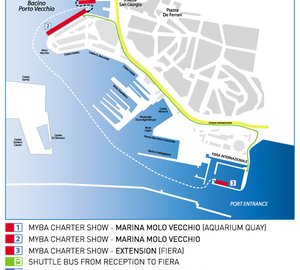
2011 MYBA Genoa Yacht Charter Show expands with extra dockage

Inaugural Superyacht Captains Forum in Auckland a success – Superyacht Captains enjoy Pacific tour
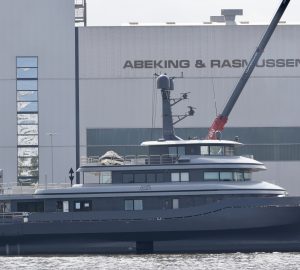
Abeking & Rasmussen’s 41-meter superyacht NURJA relaunched after refit

Aegean Yachts unveil 26m explorer yacht HEKATE
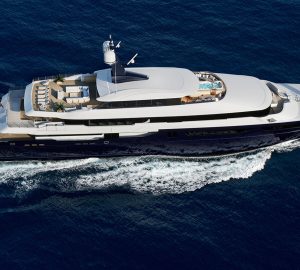
Late summer special offer on board 72m superyacht ARBEMA in the Western Mediterranean

The International SeaKeepers Society will host its 2024 annual Founders Event in October

OCEA delivers 33m motor yacht ARAOK II to her new owner
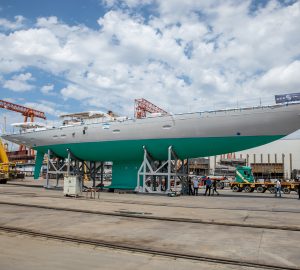
39m sailing yacht LINNEA AURORA launched by SES Yachts

A luxury charter yacht is the perfect way to encounter New England’s fall foliage display

A first look at 55m superyacht PROJECT AGNETHA from Heesen Yachts

Charter yachts offering citizen science opportunities around the world
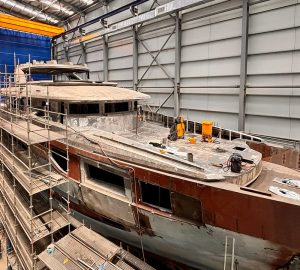
44m superyacht ORION ONE reaches a construction milestone
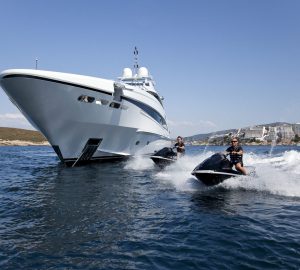
44m charter yacht JEMS offers 9 days for the price of 7 in August in Italy
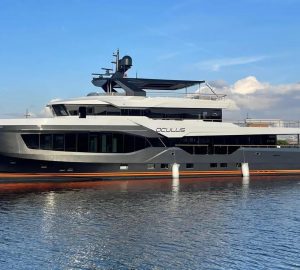
37m luxury explorer yacht OCULUS brand new to the charter market on both sides of the Atlantic

Yacht Crew Positions and Salaries
The organisational structure onboard a superyacht follows a strong hierarchy based upon a military model. Exact job duties and lines of authority are set and strictly adhered to. This hierarchy is followed on the vast majority of yachts; however, responsibilities of the crew on smaller yachts are often merged.
There are four departments on yachts with clear organisational structure:
- Deck (including Bridge) – Safety, passage delivery, maintenance of the yacht's exterior, guest outdoor activities
- Engineering – Safety and smooth operational running of the yacht
- Interior – Housekeeping, guest wellbeing, activities, accounting
- Galley – Food preparation, stock control, hygiene, galley maintenance
The top of the hierarchy on each yacht is the Captain , who reports to the yacht owner either directly, or through a representative or a yacht management company.
Salaries vary and depend on the yacht size, use, type and location, as well as the experience and qualification of the crew member. We included typical salaries of crew based on the data available from reputable industry sources, as well as our research of over 60,000 crew registered with us.
Deck Positions
The primary duty of the Captain is the overall safe manning and operation of the yacht. Yacht Captain is responsible for the vessel, yacht crew, owner and guests, including personnel management, shipyard/project management, legal and regulatory compliance, accounting, achieving owners' objectives, and answers to the owner regarding all decisions.
| Captain | €4,000 - €15,000 |
First Mate / Chief Officer
The First Mate or Chief Officer is the right hand of the Captain. Takes command of the yacht from Captain when required. Shares Captain's responsibilities as required.
| Chief Officer | €3,000 - €13,500 |
| 2nd Officer | €3,000 - €8,000 |
| 3rd Officer | €2,500 - €6,000 |
| Security Officer | €3,000 - €5,000 |
Bosun / Lead Deckhand
Bosuns are usually experienced Deckhands with additional responsibilities. They are in charge of Deckhands onboard the yacht and often spend a lot of time with guests during outdoor activities. The Bosun is normally the main tender driver.
| Mate | €2,500 - €6,000 |
| Bosun | €2,500 - €5,500 |
| Lead Deckhand | €2,500 - €5,000 |
Responsible for the maintenance of the exterior of the yacht and keeping it in pristine condition at all times. Deckhands also assist in maintaining, cleaning and operating yacht's tenders.
| Junior Deckhand | €2,000 - €3,000 |
| Carpenter | €3,000 - €4,000 |
Engineering Positions
Chief engineer.
Responsible for the Engineering Department and for all technical aspects of the boat and its equipment. The Chief Engineer's duties include overseeing all mechanical and electrical operations, ensuring all planned maintenance takes place and liaising with subcontractors.
| Chief Engineer | €5,000 - €15,000 |
Second / Third Engineer
The Second and Third Engineers report directly to the Chief Engineer. They assist in maintaining all mechanical and electrical operations of the yacht.
| 2nd Engineer | €3,000 - €10,000 |
| 3rd Engineer | €2,500 - €6,500 |
| Sole Engineer | €3,500 - €12,000 |
| Motorman | €2,500 - €4,000 |
ETO / AV/IT Officer
Electro-Technical Officer (ETO) and AV/IT Officer are in charge of daily maintenance of all electronic, computer, audio/visual and communications equipment and their efficient operation. This includes the radio, radar, telephones, satellite communications, navigation systems, computers, Internet connection, interior equipment (TVs, sound systems), etc.
| ETO | €4,000 - €8,000 |
| AV/IT Officer | €4,000 - €7,000 |
Electrician
The Electrician is responsible for maintenance of all electrical circuits onboard the vessel, circuit breakers, switches, lighting, batteries, etc.
| Electrician | €4,000 - €6,500 |
This is an administrative position on large yachts. The Purser is responsible for all operations in the interior department, including inventory, purchasing, provisioning, accounting, organising guest activities, and assisting the Captain with the yachts paperwork.
| Purser | €5,000 - €9,000 |
Chief Steward(ess)
Duties are similar to those of other Steward(ess)es onboard the boat, but on a more senior level, including managing the interior department and training. Small yachts with less crew do not have a Purser. The Chief Steward(ess) is in charge of all the responsibilities normally carried out by the Purser on large yachts.
| Chief Steward(ess) | €4,500 - €8,500 |
| Interior Manager | €4,000 - €8,000 |
| Head of Servicer | €4,000 - €7,000 |
| Head Housekeeper | €3,000 - €5,500 |
| Spa Manager | €3,500 - €5,500 |
Steward(ess)
Steward's or Stewardess's main responsibility is to maintain the interior of the yacht and provide the highest standard of care to the owner and guests. They serve food and drinks, prepare guest activities, pack and unpack luggage and are on call for anything that the guests want anytime day or night. On some yachts, they help the deck crew moor the yacht.
| 2nd Steward(ess) | €3,000 - €6,500 |
| 3rd Steward(ess) | €2,500 - €4,000 |
| Spa Steward(ess) | €3,000 - €4,000 |
| Service Steward(ess) | €2,500 - €5,000 |
| Housekeeping Steward(ess) | €2,500 - €4,000 |
| Laundry Steward(ess) | €2,500 - €4,000 |
| Sole Steward(ess) | €3,000 - €6,000 |
| Junior Steward(ess) | €2,000 - €3,500 |
| Butler | €3,500 - €6,000 |
| Stew/Deck | €2,500 - €4,000 |
The Head/Executive Chef onboard a luxury superyacht is a culinary trained professional responsible for the overall management of the galley department on larger yachts, including guest and crew meals, provisioning, food safety, maintaining strict hygiene standards and financial/budgetary administration.
| Head Chef | €6,000 - €10,000 |
Assists the Head Chef in all aspects of galley duties. The Sous Chef may be required to independently provide crew meals or guest meals at the direction of the Head Chef.
| Sous Chef | €3,500 - €8,000 |
Crew Chef / Cook
Large yachts employ a separate crew and guest chef. The Crew chef provides meals for the crew.
| Crew Chef / Cook | €3,000 - €5,000 |
| Sole Chef | €3,500 - €9,000 |
| Stew / Cook | €2,000 - €4,500 |
Other Positions
Many yachts, especially the large ones, have several additional positions. These are often combined with primary roles, e.g. Stewardess / Masseuse or Deckhand / Dive Instructor . The most common are:
| Beautician | €3,000 - €4,000 |
| Hairdresser | €3,000 - €4,000 |
| Massage Therapist | €2,000 - €4,500 |
| Nurse | €3,000 - €4,500 |
| Dive Instructor | €3,000 - €6,000 |
Career Advice:
Email address:
Remember me Forgotten password?
Password Reset
Enter your email address and we will email you a password reset link.
Email address:

Yacht Crew Salaries: The Current State
Posted October 12, 2023 by Ashleigh King
The topic of salaries in the yachting industry has gained attention this year, with a growing sense of awareness and discussion. Louisa had the opportunity to speak with several dedicated crew members who have shared their thoughts and concerns about this matter. With the ever-changing economic landscape, it’s crucial to assess whether salaries for yacht crew have adapted to these shifts in a positive direction.
A comprehensive analysis of Dockwalk’s salary surveys over the past several years reveals a rather consistent pattern spanning a 15-year period. Specifically, when comparing salaries in euros for a 50-meter yacht between 2008 and 2023, certain trends emerge. In the case of Captains, the industry average in 2008 ranged from 7,000 to 10,000 euros per month, while this year, it has extended from 7,000 to 15,000 euros per month. Similarly, Chief Engineers in 2008 were earning an average of 5,000 to 7,000 euros per month, whereas in 2023, their earnings range from 5,000 to 10,000 euros per month. It is noteworthy that while the lower-end salaries have remained relatively consistent, the upper-end figures have witnessed a significant increase, aligning more closely with industry expectations.
While the top-end salaries can be attributed to experience and longevity, it remains pertinent to question why the baseline salaries have remained at their current level. This inquiry may stem from the various factors related to job availability and individual crew preferences. It’s possible that, after a period of uncertainty, many crew members are now placing a higher value on the stability of full-time positions over seeking higher pay.
Engaging with numerous crew members who express diverse expectations and requirements underscores the challenge of establishing industry standards, especially considering the growing prevalence of rotational contracts. A notable example illustrates this complexity: I recently met a Captain who was perplexed by the stark disparity in his salary compared to that of a colleague. However, one crucial aspect he overlooked was that his counterpart had been with the same owner for four additional years, underscoring the significance of longevity in this profession.
Furthermore, entry-level crew members are facing their own set of challenges. Green crew are currently being offered a monthly compensation of 2,000 euros, which is nearly the same from 15 years ago when it ranged from 2,000 to 2,500 euros.
While the average monthly compensation for green crew hasn’t seen substantial growth over the past 15 years, it’s essential to acknowledge the rising costs associated with crew housing, food, and travel. In this light, exploring creative solutions to improve the financial well-being of entry-level crew members is a valuable consideration.
While the topic of salary stagnation in the yachting industry has raised concerns, there is also a silver lining. Salaries for experienced crew members have been on an upward trajectory, and the industry is evolving to accommodate different needs and preferences. By focusing on the positive aspects of these changes, we can look forward to a brighter future for all members of the yacht crew community.
Download our Crew Salary Guideline PDFs in Dollars and Euros for more helpful information.
With our presence established in the key yachting hubs worldwide, we stand ready to address all your crew-related requirements. Don’t hesitate to reach out and schedule a consultation with one of our dedicated N&J Crew team members today!

Proud to be part of the MarineMax family
© 2024 Northrop & Johnson
Yacht Crew Salaries
Average starting salary guidelines.
The crew salaries reflected below have been derived from placement records and job orders for both power and sail, reflected as an average, received by Crewfinders within the past year and may change without notice.
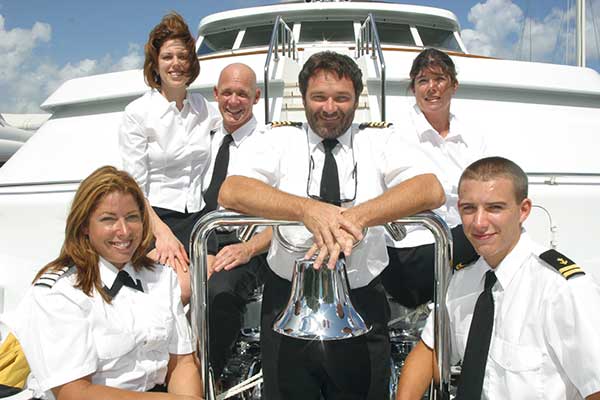
Yacht Crew Job Board
With Bluewater's expertise in crew training and yacht crew recruitment, finding your ideal yacht crew vacancy is simple. We offer yacht management services to a variety of exclusive superyachts. Our team excels in sourcing top-notch yacht crew positions, spanning from 25-meter private yachts in the Bahamas to 50-metre charter yachts in the Mediterranean to luxurious 100+ metre superyachts navigating the globe extensively.
50 yacht crew jobs available now.
Yacht Crew Training
Alongside sourcing the latest yacht crew jobs worldwide, Bluewater offers a range of specialised yacht crew training courses. Whether you're new to the superyacht industry seeking entry-level qualifications, an experienced deckhand or engineer aiming to advance your career, or a dedicated crew member looking to enhance your resume with certifications like HELM (Human Element Leadership and Management), Yachtmaster, or OOW (Officer of the Watch), explore our comprehensive yacht crew training options.
Working on a Luxury Yacht
Working as a crew member on a superyacht is undeniably one of the most rewarding yet demanding professions, calling for hard work, dedication, and professional training. The opportunities within the yachting industry are vast, and at Bluewater, we are committed to helping every crew member discover their ideal yacht crew position. Our recruitment division focuses on finding the perfect yacht for crew members and provides unparalleled professional support. Our recruitment experts guide crew members through every step of their yachting career journey, ensuring they receive the best possible assistance.
Manage Your Yacht Career
Whether you're seeking a yacht crew position as a deckhand, engineer, onboard masseuse, stewardess, chef, chief stewardess, purser, first officer, or captain, take control of your yacht career. Create a profile and join one of the world's largest yachting communities for free.
50 JOBS FOUND

- Qualifications: STCW, ENG1, Food Hygiene Level 2
- Experience: 3 Years +
- Salary: 4500EUR
- Qualifications: Master 200gt
- Experience: 5 years as Captain/Engineer
- Salary: Attractive salary (doe)
- Rotational 2:2
- Qualifications: STCW, ENG1, FHL2
- Experience: 18 months as chief stew
- Salary: $7000
- Experience: Open
- Salary: DOE
- Experience: 2 Seasons +
- Salary: 2500 euros
- Qualifications: STCW, ENG1
- Experience: 1 Season +
- Salary: 4500€
- Qualifications: Yachtmaster Offshore
- Experience: 2 Years +
- Temporary (5 Days)
- Qualifications: Y2
Back to Blog
Captains Clients Superyacht Industry Insights
Superyacht Captain salary survey 2023 18 December 2023
captain salary survey crew salary survey superyacht captain superyacht salaries yacht captain
In our biggest salary survey yet, we have uncovered detailed insights into Superyacht Captain salary and leave packages.
Almost 300 Captains responded across a range of yacht sizes from sub-30m to 100m+. In addition to average pay and leave, pay rise and bonus activity, the 20+ page report also compares Captain and Chief Officer experience, ticket level, longevity onboard and comparisons to our 2020 and 2022 survey findings.
Some top-level statistics are:
- Every yacht bracket has seen a salary rise since 2020 and 2022.
- Full rotation is also increasing and becoming more prevalent on sub-50m yachts, with an 11% decline overall in Captains with less than 59 days leave.
- Two-fifths of Captains receive an annual pay rise, although this is not part of their contract.
- 38% receive a 13th-month bonus, but random and unpredictable bonuses are more commonplace.
- 70% of Captains have Master 3000.
- Exactly half of the Captains who responded have more than 10 years’ experience in the role and 32% were Chief Officers for 3 to 5 years prior.
- A third have been Captains on their current yacht for more than 3 years.
- Flight allowance improves with yacht size, with 49% of Captains receiving Business Class flights as part of their package.
- The average age at which respondents first became Captain is 32.5 years old.
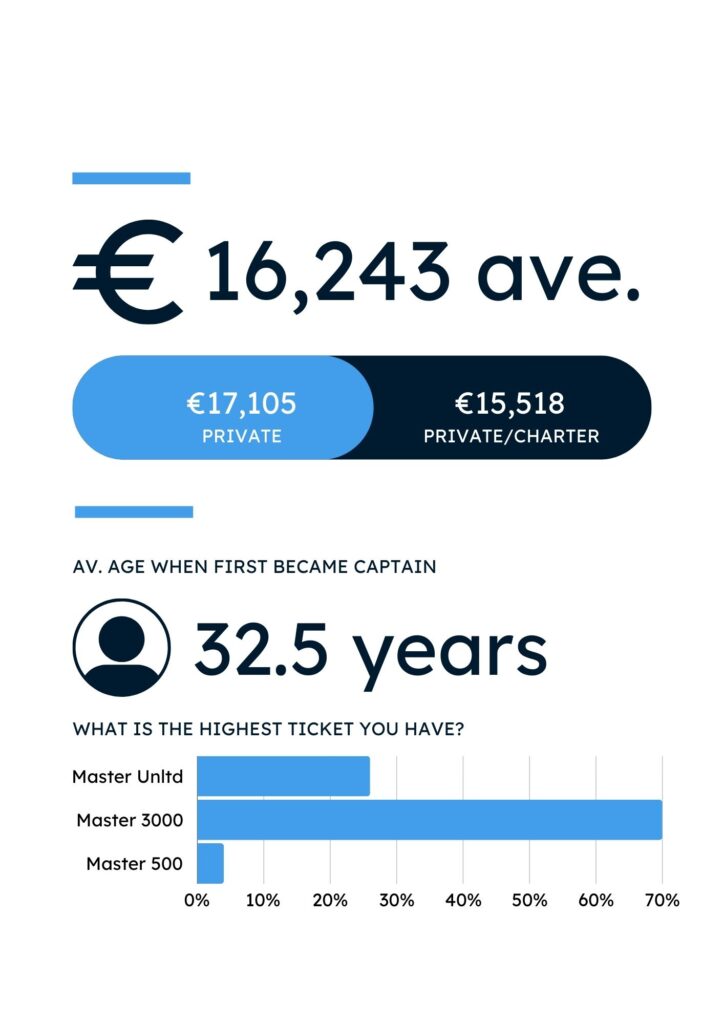
The full report contains a comprehensive analysis of salaries and leave in each yacht size bracket and also compares full time with rotational roles, as well as explores any correlation between experience and type of ticket.
Simon Ladbrooke, Captain Consultant at Quay Crew, commented:
“In our most detailed salary report to date, we have gained an insight into the real-time compensation Captains receive, broken down by yacht size and with several other comparables too.
“A key takeaway this year is that, despite a slight decline in salaries between 2020 and 2022, the average monthly pay is now higher across all size brackets, representing a median 6.75% increase.
“Time for time rotation has also grown in popularity on all sized yachts, with the exception of <39m yachts which are all full-time at the moment.
“By gathering Chief Officer experience as well as longevity on their current yacht, we can surmise that onboard promotion is on the rise. The average age that someone becomes Captain is now older and the number of years of experience as Chief Officer is higher, suggesting the transition is also taking longer.
“This is undoubtedly down to there being more competition amongst candidates and it being more difficult to make that initial step up.
“Yet, almost three-quarters say it took them less than 6 months to get their first Captain role. This could be, along with the extensive CO experience demonstrated in this survey, largely down to onboard promotion.
Having said that, we were very surprised at this statistic as it doesn’t match at all with our experience. Often, Chief Officers are looking for several years before they finally get their opportunity. It’s something we definitely want to explore further in another survey.”
All HOD salary surveys are available on our client portal, which you can request access to here.

About the author
Simon Ladbrooke
Compassion at christmas: the yachting edition, interview questions to ask as a captain candidate.
- Superyacht Recruitment Services
- Superyacht Captain Recruitment
- Partnerships
- Meet the Team
- Work for Us
- Current Vacancies
- Crew Resources
- Candidate Login
- Candidate Registration
- Client Login / Register
- Candidate Login / Register
Impartial training and careers advice
Call us: +441983 280 641
+441983 280 641
Superyacht Crew Salary Guide – 2023
- Superyacht Crew Salary Guide – 202...
Working as a crew member on a Superyacht has some incredible perks…
… from being on the ocean and seeing new countries to brushing shoulders with the rich and famous and, of course, earning an amazing salary.
As we begin 2024, we thought it a good opportunity to look back at 2023 to see how the industry faired and whether there have been any changes to salary, tips, and working conditions.
The good news is that things have got better! Since the pandemic, the Superyacht industry has seen significant growth the industry has grown significantly over the last couple of years .
As the number of Superyachts being built increases, so does the demand for crew; there has never been a better time to enter the industry.
Typically, the entry-level salary for a Deckhand and Steward/ess ranges between €2,000 and €3,500, rising to €4,000+ for more senior roles. A Captain can make €10,000+ per month, depending on the size of the Superyacht!
Moreover, as you’ll be living onboard the yacht, there are no living expenses to worry about. Your meals are prepared by the Chef onboard, too, and you rarely need to buy groceries or toiletries.
We can’t talk about Superyacht Salary without mentioning tips. The majority of Superyacht owners charter their yachts as the ultimate holiday experience! A Superyacht does not come cheap, with some chartering for One Million per week! Guests normally leave a tip and around 10% of the charter fee, which is shared equally among the crew. It is not unheard of for a Deckhand or Steward/ess to receive a €5,000 tip after a week’s trip!
Another huge benefit contributing to the amazing Superyacht salary is the potential for tax-free earnings (typically paid in Euros)!
Read on for our complete guide to the Superyacht crew salary for 2023…
How much do you make working on a Superyacht?
In short, your salary will depend on the role you work in on the Superyacht, in conjunction with its size; however, the average salary is €2,500 per month (most boats pay in Euros rather than pounds).
Several other factors will determine Superyacht crew salary, too, including previous experience, qualifications, and extra skills (such as Dinghy Instructor, Carpenter, and Divemaster, to name a few).
Whether the yacht is chartered or privately owned will all contribute to your monthly pay packet; your basic salary will be the same whether you work on a charter yacht or a private boat, though on a charter, you will generally receive tips; this usually around 10% of your monthly salary, or it can range between €1,500 to €5,000+ .
We’ve shared current Superyacht salary approximations for 2023 in the table below:
How much do you make working on a yacht?
| Captain | €4,000-€7,000 | €7,000-€14,000 | €14,000+ | €16,000+ |
| First Officer | €3,000-€5,000 | €4,300-€5,700 | €6,000+ | €7,000+ |
| Bosun | €3,200-€4,500 | €4,000 | €5,000 | |
| Chief Stewardess | €3,000-€4,500 | €4,000-€6,000 | €6,000+ | €7,000+ |
| Experienced Stewardess | €2,800-€3,000 | €2,800-€3,500 | €3,500+ | €4,500+ |
| Experienced Deckhand | €2,800-€3,500 | €2,800-€4,000 | €3,500+ | €4,500+ |
| Junior Stewardess | €2,000-€3,000 | €2,000-€3,000 | €3,000+ | €3,000+ |
| Junior Deckhand | €2,000-€3,000 | €2,000-€3,000 | €3,000+ | €3,000+ |
| Chef | €3,000-€4,500 | €4,000-€7,000 | €6,000+ | €7,500+ |
Here’s a breakdown of Superyacht crew salaries in more detail by role:
Superyacht captain salary – €4,000 to €16,000+.
A Superyacht Captain is responsible for all activity onboard, crew safety and well-being, and the experience offered to guests.
The Captain is the owner’s main point of contact on the yachts; whether things are going right or wrong, it can be a highly pressured and stressful job.
The salary reflects the responsibility in this high-pressure environment, and the range in salary normally depends on experience and the boat’s length.
Generally, larger boats will carry more guests and staff; therefore, the Captain will have higher responsibilities, a bigger budget, and more challenges to cope with.
First Officer salary – €3,200 to €8,000+
The First Officer, also known as Chief Officer or Chief Mate, is always second in command to the Captain.
They will assist the Captain in a wide range of duties and tends to be responsible for the safety of the Superyacht and everyone on board. Furthermore, the role of the First Officer also includes bridge watches and navigation.
Due to needing a firm understanding of working on deck, the First Officer normally starts their career as a Deckhand and progresses from there.
If you are an experienced First Officer and have moved onto larger yachts, then your next step will be to become a Captain.
Superyacht Bosun salary – €3,200 to €5,000+
Otherwise known as the Senior Deckhand, the Bosun is the ‘line manager’ of all Deckhands on the boat. The responsibilities of the Bosun are to manage and maintain the exterior of the yacht to the highest order.
This role also includes spending time with the guests, making sure they are having fun and are safe on all the toys the Superyacht has, such as jet skis and dinghy sailing boats.
Chief Stewardess salary – €2,800 to €7,000+
The Chief Stewardess is responsible for the interior of the Superyacht. Attention to detail, elegance, and cleanliness is paramount for this role.
Moreover, you will be required to perform duties discreetly and anticipate the requests and demands of guests, as well as manage your team of Stewardesses. A managerial background in hospitality will, therefore, help for this role.
Generally, the Chief Stewardess will have gained previous experience in an entry-level Stewardess role and fully understands the functions of a working Superyacht.
Superyacht Stewardess salary – €2,000 to €3,500+
This is an entry-level position working on board a Superyacht.
Open to Male and Female
Being a Superyacht Stewardess is a wide-reaching role covering three main areas: Service, Housekeeping, and laundry. Your actual day-to-day activities can vary depending on the type of yacht (private or charter), owner, and Itinerary. You will be the host, cleaner, florist, and housekeeper, and collectively responsible for looking after the guests 24/7.
If you are looking at not going to uni , and want a career with real progression and a very good salary, becoming a Superyacht Stewardess could be for you! If you would like to start a career as a Stewardess, then consider joining our Superyacht Steward/ess course.
Superyacht Deckhand salary – €2,000 to €3,500+
This is another entry-level role to work on a Superyacht.
Open to male and female
A very hands-on role, the Deckhand is responsible for the exterior of the yacht, and tasks will typically involve cleaning, painting, sanding, varnishing, and all general maintenance of the boat.
As with all Superyacht roles, working as a Deckhand requires some skills and qualifications before you start looking for work. The good news is that you don’t have to go to Uni to get whats required. You will be able to get qualified in a few weeks.
How to become a Superyacht Steward/ess or Deckhand.
If you want a career in the Superyacht Industry, we are here to help. Contact us by phone, email, or live chat. Alternatively, book a meeting with one of our career advisors.
Looking for more information on working in the Superyacht industry?
Download our free guide and learn all there is to know about working on a superyacht as a deckhand or steward/ess., related articles.
- Seafarers Tax
5 ways to ensure your SED claim is rock solid
The Seafarers’ Earnings Deduction, often referred to as the SED, is a tax legislation that enables seafarers to claim back their UK income tax. It a...
Do I need to pay off my Student loan if I work on a Superyacht?
Good question! First, let me say that the information below is aimed at people who have studied in the UK and took out a Student Loan to cover course ...
Have I got the right experience to work in yachting?
If you’re thinking about working on board a Superyacht, we share the skills and experience you need and how to get into the yachting industry in thi...

Yacht Crew Salary Guide

To accompany the launch of our new Jobs Board, below is a brief description of the role of each crewmember, with average salaries listed.
Please be aware that both roles and salaries vary from boat to boat and this should not be considered an official job guide.
A captain is legally in charge of their vessel. They are responsible for the safety of the passengers, the crew, the environment on board and the vessel. They are also in charge of personnel management, navigation, rules and regulations compliance and accounting. They have to be licensed depending on their nationality and the registration, weight and program of the vessel.
A captain must have considerable maritime experience and training, excellent navigational skills, superior leadership, communication, management and diplomacy skills. A captain of a superyacht must have excellent nautical knowledge, maintenance, engineering and technical practice, as well as experience with accounting, IT and administrative paperwork. A captain must have a calm and charismatic personality and be highly skilled at dealing with people, both crew and owners/guests.
Average salary (per month):
< 60ft (18m) à 2,200€ - 3,700€
60ft < 75ft (23m) à 3,000€ - 5,200€
75ft < 100ft (33m) à 3,700€ - 5,200€
100ft < 125ft (38m) à 6,000€ - 8,200€
125ft < 160ft (48m) à 6,000€ - 10,000€
160ft < 200ft (60m) à 6,700€ - 10,000€
200ft (60m) > à 7,400€ +
CHIEF OFFICER/FIRST MATE
Every superyacht tends to have a Chief Officer but larger yachts may also have a Second Officer. Job requirements are similar but will vary slightly depending on the vessel.
The Chief Officer assists the Captain with administrative and safety duties, crew management, maintenance and deck equipment, navigation and finances. The First Officer arranges safety drills, sets watch schedules and prepares the yacht for sea. The Second Officer acts as an aid and an understudy to the First Officer.
The Chief Officer/First Mate must be able to stand in for the Captain in his absence, have strong communication and organizational skills, and have excellent ISM and ISPS knowledge and practices. The Chief Officer must be someone with a firm knowledge of working on deck through previous Deckhand or Bosun experience.
60ft < 75ft (23m) à 2,200€ - 3,000€
75ft < 100ft (33m) à 2,600€ - 4,100€
100ft < 125ft (38m) à 3,000€ - 4,500€
125ft < 160ft (48m) à 3,400€ - 4,800€
160ft < 200ft (60m) à 4,100€ - 5,200€
200ft (60m) > à 4,800€ +
The Bosun is responsible for the maintenance and cleanliness of a yacht and is in charge of the Deckhands. They are in charge of deck operations, which include storage, use and maintenance of tenders and toys, equipment and deck supplies. They will most likely be the main tender driver.
The Bosun must be an experienced deckhand, with knowledge of all equipment on board, maintenance skills (painting, varnishing) and basic engineering abilities. The Bosun will most likely spend a lot of time with guests and owners when on board and therefore must be polite, enthusiastic and have a keen eye for detail and service.
Average salary (per month): 100ft (33m) – 250ft (76m) à 2,200€ - 3,300€
The deckhand’s job is to assist in the maintenance, cleanliness and manoeuvring of the boat and tenders, and to help other crew wherever needed- whether in the interior, galley or engine room.
A deckhand must have a hard work ethic, the ability to learn on the job, be presentable and well-mannered, and excel at teamwork.
Average salary (per month): 60ft < 75ft (23m) à 1,500€ - 2,200€
75ft < 100ft (33m) à 1,500€ - 2,500€
100ft < 125ft (38m) à 1,800€ - 2,500€
125ft < 160ft (48m) à 1,800€ - 2,500€
160ft < 200ft (60m) à 1,800€ - 2,500€
200ft (60m) > à 1,800€ +
Engineering
Chief engineer.
The Chief Engineer is in charge of the engineering department of a vessel and is responsible for its safe and proper functioning. They manage and train the other Engineers, ETOs (Electronic Technical Officers) and oversee contractors, and reports directly to the Captain. The Chief Engineer looks over the engine room operations, supervises engine repairs and carries out engineering inventories.
The Chief Engineer must have expert technical and trouble shooting experience, advanced knowledge of engineering on board (engines, fuel, generators, water makers, air conditioning, electrical, refrigeration, AV systems and computers), be able to preventive malfunctions and multitask, and have knowledge of contractors.
120ft (37m) – 180ft (55m) à 3,700€ - 6,700€ +
180ft (55m) – 250ft (76m) à 5,500€ - 10,400€ +
The Electronics Technical Officer is found on larger yachts; where there is no ETO the Chief Engineer assumes these responsibilities.
The ETO is responsible for daily maintenance of all electronic, computer and communications equipment on board and prevents malfunctions.
An ETO must have prior experience with IT and audio/visual equipment, be flexible and to assist in teamwork such as line and fender handling and water sports.
160ft (49m) – 300ft (92m) à 2,200€ - 3,300€ +
JUNIOR ENGINEER
Many Chief Engineers may have started out as Junior Engineers. Their tasks include ensuring the constant safety of the engine room through cleaning and maintenance. This way they are able to increase their knowledge of all systems on board.
Junior Engineers are hard working, have the ability to learn through observation on the job, are able to multitask and help in any area of the yacht when needed.
On larger yachts there will often be First, Second and Third Engineers acting under the orders of the Chief Engineer. Duties will vary from one boat to another.
160ft (49m) – 300ft (92m) à 2,200€ - 3,700€ +
Note: A purser tends to be found on larger yachts; where no purser is required, some of the following duties are covered by the Chief Stewardess.
The purser is responsible for all operations in the interior department. That includes inventory, purchasing and provisioning, accounting for the entire yacht, organising guest activities and assisting the Captain with ship’s paperwork.
A purser must have experience as a Chief Steward/ess, financial and computer skills, as well as superior communications, organization and delegation abilities. They must also have an excellent knowledge of service and housekeeping skills, and well as familiarity with restaurants and attractions in cruising areas.
160ft (48m) – 250ft (76m) + à 3,700€ - 6,000€
CHIEF STEWARD/ESS
The Chief Steward/ess is in charge of supervising the interior management of the boat, and training interior crew. She or he is responsible for the budgeting and planning of the interior, all with the aim of creating the best possible service for the owners/guests.
Guest-oriented tasks include food and drink service, overseeing cleaning, cabin preparation, and arranging transport and trips for guests or owners.
The chief steward/ess is also responsible for the crew communal areas, as well as making sure the crew are looked after in regards to uniform, toiletries, drinks and snacks.
The Chief Steward/ess will have previously worked as a Steward/ess and acquired a strong background in food and drink and hospitality and is capable of assisting with lines and fenders on deck. They must have impeccable attention to detail, the ability to think ahead and to remain professional and unobtrusive when serving guests in a luxury, high-quality manner.
100ft (33m) - 140ft (43m) à 2,200€ - 3,000€ +
140ft – 250ft (76m) à 3,000€ - 5,200€ +
STEWARD/ESS
A Steward/ess is responsible for the hospitality and housekeeping of the interior of the boat, and for the service to the owners and guests. Tasks include cleaning, table setting, silver service, bartending, flower arranging, inventory and planning. They may be asked to assist the chef or cook for the crew, help out on deck and watch keep when necessary.
Other Steward/ess positions include Second Steward/ess, Service Steward/ess, Housekeeping Steward/ess and Laundry Steward/ess. Duties will vary from one boat to another.
Average salary (per month): Note:Salaries vary depending on whether you are a First, Second or Chief Steward/ess.
60ft < 75ft (23m) à 1,500€ - 2,600€
75ft < 100ft (33m) à 1,800€ - 3,000€
100ft < 125ft (38m) à 1,500€ - 3,300€
125ft < 160ft (48m) à 1,800€ - 3,300€
160ft < 200ft (60m) à 1,800€ - 3,700€
The chef’s role is an extremely important one because guests and owners will always remember the food they had, regardless of the size of the yacht.
It is a very challenging position and a chef’s typical work day is extremely long. They are in charge of planning meals and purchasing ingredients (which might entail changing languages and currencies), preparing food and cleaning up to ensure the galley is kept in pristine condition. Depending on the size of the yacht, the Chef might work solo or there might also be a Sous Chef, Second Chef or Crew Cook.
Most Chefs will have previous experience of working as a Chef or Sous Chef in hotels, restaurants or other yachts. They must have a vast knowledge of produce, diets, allergies and food safety and storage, and the ability to provision to a budget in obscure parts of the world. All the while they must keep a positive attitude, have excellent time management, strong communication skills and the ability to overcome seasickness.
Average salary (per month): 100ft (33m) – 160ft (48m) à 3,700€ - 5,200€ +
150ft (46m) – 250ft (76m) à 3,7000€ - 7,400€ +
On larger yachts, it is common to have a Crew Chef who is in charge of preparing meals for the crewmembers. They might also act at Sous Chefs or simply be the crew’s personal Chef. They take orders from the Head Chef.
Average salary (per month): 160ft (48m) – 250ft (76m) + à 2,300€ - 3,100€
------------------------------------------------------------ * Note : All salaries are estimates and can vary significantly

- Yacht Department Directory
- Deck Department
About the Captain
The captain onboard a yacht has a record of longevity, excellent owner references and strong crew management skills. This individual should possess working knowledge of yacht management and safety in addition to financial administration. The captain will excel in planning and communicating various itineraries to the owners and guests onboard in various cruising areas. All their certifications and licenses are fully up-to-date and they are familiar with the latest requirements/newest technologies. This role usually requires at least five years of experience on yachts.
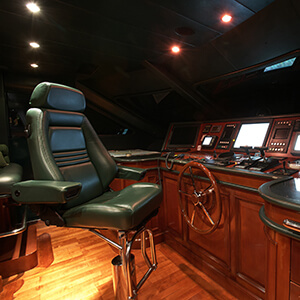
Job Responsibilities
- Ultimate safety for passengers, crew, environment and vessel
- Achieving owner's objectives
- Crew hiring and dismissal
- Personnel management
- Shipyard/project management
- Legal and regulatory compliance
Required Skills
- Calm and charismatic personality
- Superior leadership, communication, management and diplomacy skills
- Excellent boat handling and navigational skills
- Excellent ISM and ISPS knowledge and practices
- Excellent maintenance, engineering and technical / troubleshooting experience
- Ability to remain calm and give directions in an emergency situation
- Organized and methodical
- Financial management
Salary Modifiers
- Speaks multiple languages fluently
- New build experience
- Project Management certification or Management degree
- Limited experience in intended cruising area
- Lack of experience on a similar size vessel
Position Statistics
Career path, senior master, junior captain, first officer / chief mate, officer of the watch, junior deckhand.
We use cookies to improve your browsing experience.
And dolphins make us happy. Find out more about our cookies policy here .
The Best Boat Rentals in Krasnodar Krai
Browse, book, and get out onto the water with local captains and boat owners., our favorite boat rentals in krasnodar krai.
- Boat Rentals
Krasnodar Krai
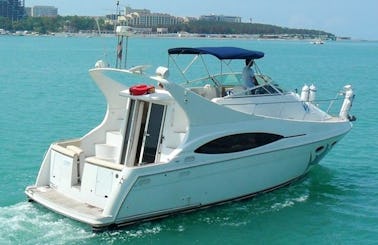
Motor Yacht Charter in Gelendzhik

Wind Surfer Lesson In Sochi
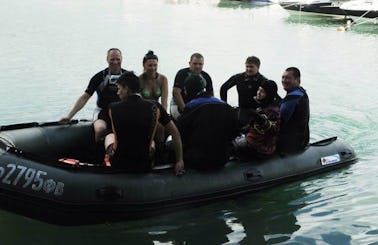
Boat Diving Trips in Gelendzhik.
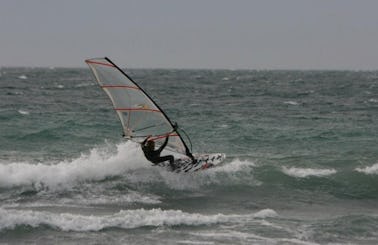
Windsurf Board Rental and Lessons in Anapa

'Anastasia' Cuddy Cabin Boat Charter in Gelendzhik

'Tahiti' Sailing Gulet Charter in Gelendzhik

Motor Yacht rental in Sochi, Russia

'Victoria' Sailing Monohull Charter in Gelendzhik
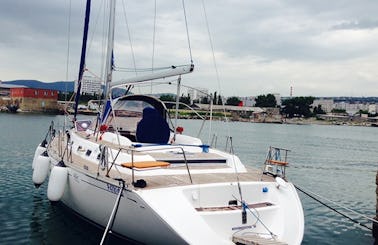
Dufour 43 Sailing Monohull Charter in Gelendzhik
Suggested searches, types of boats popular in krasnodar krai.

Explore local waters with a boat rental dedicated to sightseeing and exploration
₽820-₽19,280

Who says you need a motor to have fun on the water?
₽820-₽1,190

Set sail with these traditional wind-powered boats
₽1,640-₽5,390

From mid-size to mega yachts, these luxury boats are great for groups and celebrations
₽1,640-₽7,490

Explore the ocean depths with trained boat operators
₽1,640-₽19,280
Top Boat Rental Locations Near Krasnodar Krai
Gelendzhik , Krasnodar Krai
Most Popular Boat Tours in Krasnodar Krai

Diving Tours and Lessons in Gelendzhik, Russia
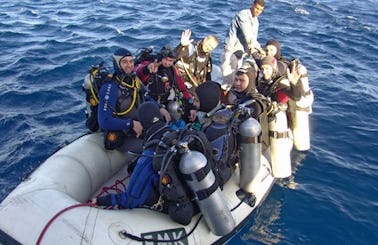
RIB Diving Courses in Krasnodar, Russia
Most popular kayak rentals in krasnodar krai.

Kayak Rental In Sochi
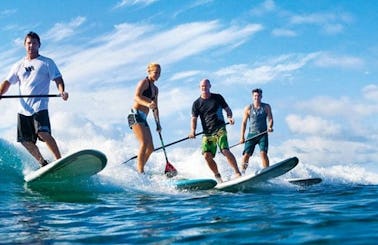
Stand Up Paddleboard Rental In Sochi
Top boat rental locations in russia.
Moscow , Moscow
Saint Petersburg , Russia
Okrug Petrovskiy , Saint Petersburg
Irkutsk , Irkutsk Oblast
Bolshoy Sochi , Krasnodar Krai
How To Book on Getmyboat
Find the right listing for you and your crew, with options for boat types, group size, captained or self-charter, and lots more.
Inquire & Book
Found one you like? Send a rental inquiry with your preferred trip details, and you’ll receive an offer from your captain to book.
Coordinate a pick-up place and time, meet your boat captain, and get out onto the water!
- About Getmyboat
- Media Inquiries
- Terms of Use
- Privacy Policy
- Cookies Policy
- Accessibility Statement
- Member Interface Agreement
- How It Works
- Mobile Apps
Experiences
- Jet Ski Rental
- Fishing Charters
- Houseboat Rental
- Pontoon Rental
- Yacht Rental
- Sailboat Rental
- Bachelorette Party Boat Rental
- Party Boat Rentals
- Company News
- Experiences Guide
- Destinations
- Tips for Renters and Owners
Popular Destinations
- Lake Lanier
- Lake Travis
- Newport Beach
- Lake Norman
24/7 Live Support
- Help & FAQs
- +1 818 927 2148
- [email protected]
Real reviews from happy Getmyboaters.
4.9 out of 5! 500,000 + reviews
- EN ES FR PT
- Share full article

The For-Profit City That Might Come Crashing Down
The dream of Próspera, founded by a U.S. corporation off the coast of Honduras, was to escape government control. The Honduran government wants it gone.
Ricardo González, legal consultant for Honduras Próspera Inc., looking out on the Honduran island of Roatán. Credit... Brian Finke for The New York Times
Supported by
By Rachel Corbett
- Aug. 28, 2024
Jorge Colindres, a freshly cologned and shaven lawyer, handed me a hard hat to take the elevator to the 14th floor of what is now the tallest building on the Honduran island of Roatán — nearly twice what the local building code allows. When construction is complete, Duna Residences will house 82 units overlooking a jungle of palm trees, the Caribbean Sea and several other new buildings that the Honduran government considers illegal.
Listen to this article, read by Frankie Corzo
If Próspera were a normal town, Colindres would be considered its mayor; his title here is “technical secretary.” As we looked out over a clearing in the trees in February, he pointed to the small office complex where he works collecting taxes and managing public finances for the city’s 2,000 or so physical residents and e-residents, many of whom have paid a fee for the option of living in Próspera or remotely incorporating a business there. Nearby is a manufacturing plant that is slated to build modular houses along the coast designed by Zaha Hadid Architects. About a mile in the other direction are some of the city’s businesses: a Bitcoin cafe and education center, a genetics clinic, a scuba shop. A delivery service for food and medical supplies will deploy its drones from this rooftop.
There’s not much else to see yet. But the Delaware-based company that founded this experimental town in 2017 has raised $120 million in investments — including from venture-capital funds backed by the Silicon Valley billionaires Peter Thiel, Sam Altman and Marc Andreessen — to transform the territory, about twice the size of Monaco, into the most developed start-up city in the world. Built in a semiautonomous jurisdiction known as a ZEDE (a Spanish acronym for Zone for Employment and Economic Development), Próspera is a private, for-profit city, with its own government that courts foreign investors through low taxes and light regulation. Businesses can choose a regulatory framework from a menu of 36 countries or customize their own.
A California company offers a Montessori education for approximately 60 students. Security is provided by a private firm of armed guards. An arbitration center staffed by three retired Arizona judges handles dispute resolution. (In order to enter the jurisdiction, I was told I needed to sign an “agreement of coexistence” binding myself to 4,202 pages of rules, violations of which would be subject to the jurisdictional authority of the arbitration center.)

Próspera has become particularly well known for the zone’s experimental medical facilities, which run clinical trials unburdened by F.D.A. standards. The week of my visit, Patri Friedman, grandson of the economist Milton Friedman and the founder of a start-up-cities fund that invested in Próspera, had a chip with his Tesla key implanted into his hand. On a previous trip he brushed his teeth with genetically modified bacteria purported to prevent cavities. Another time he was injected with a protein booster intended to make him “stronger and faster,” as he put it at a conference in Roatán that weekend.
“I can tell you when Próspera became most real for me,” Friedman told the audience. “When I sat down to fill out my informed-consent forms that said, like, ‘This agreement is adjudicated under the laws of the Próspera ZEDE; any disputes are arbitrated by the Próspera Arbitration Center.’ Like, you are under a different set of laws.”
There are more than 5,400 of these special economic zones in the world, ranging on a spectrum from free ports for duty-free trading all the way to the special administrative region of Hong Kong. About 1,000 zones have cropped up in just the past decade, including dozens of start-up cities — sometimes called charter cities — most of them in developing nations like Zambia and the Philippines. Some have actually grown into major urban centers, like Shenzhen, which went from a fishing village to one of China’s largest cities, with a G.D.P. of $482 billion, after it was designated a special economic zone in 1980.
Each zone offers a degree of escape from government oversight and taxation, a prospect that has excited libertarian and anarcho-capitalist thinkers at least since Ayn Rand imagined a free-market utopia called Galt’s Gulch in “Atlas Shrugged.” Today, escalating clashes between the government and Big Tech — like the S.E.C.’s regulatory war on crypto, or the Federal Aviation Administration’s repeated investigations into SpaceX — have spurred some Silicon Valley entrepreneurs to seek increasingly splintered-off hubs of sovereignty. And with government dysfunction preventing reforms even in wealthy cities like San Francisco, locked in a decades-long affordable-housing crisis, and New York City, which just lost out on as much as $1 billion when Albany scrapped a 17-years-in-the-making congestion pricing plan that would have funded public transit, it’s not hard to see the appeal of starting from scratch.
In promotional materials, Próspera markets itself to “21st-century pioneers” craving not just laissez-faire policies but also “good times and Caribbean vibes.” Direct flights from Miami and Houston can transport these digital nomads to Roatán in less than three hours. Then, from a chaise longue on the beach, they can register a business with the tap of a button. Although only one residential building has been built so far, a forthcoming eco-condo was during my visit courting buyers seeking “more personal freedom” and less “political drama.” Próspera’s original investment plan projected that by 2030 the city would be home to 38,000 residents, and that foreign direct investment in the country would top $500 million by next year.
But plenty of other people find Próspera’s goal — “building the future of human governance: privately run and for-profit” — unsettling. Critics have described it as a neocolonial state within a state, or an example of corporate monarchy, where yacht-owning C.E.O.s exploit land and labor in a poor country. Keller Easterling, the urbanist and architectural theorist, considers Próspera a city in name only, akin to “say, Mattress City.” Really, she says, the zones are low-tax, deregulated marketplaces.
As we peered over the edge of the tower’s rooftop, I considered the story of a subcontractor who was working at the apartment tower at night two months earlier. The power had gone out, and he walked to the edge of the floor to yell down to his crew to turn on a generator, but took a step too far and fell to his death. If companies choose their own regulatory frameworks, as they do in Próspera, who holds them accountable if they endanger or harm one of their employees?
“Próspera ZEDE has its own set of labor systems,” Colindres said when I asked him about it later. He told me the worker’s family was compensated appropriately — receiving at least as much as was required under Honduran law — but he declined to disclose details. If an independent investigation took place, its findings have not been released to the public. After all, the point of a place like Próspera is that there isn’t really a “public” to speak of.
This lack of transparency is one common criticism of Próspera, and today, it’s unclear whether this experiment can continue. In recent years, vehement opposition from the Honduran government and neighboring communities has imperiled Próspera’s future. Now its fate — and that of the private-cities movement writ large — hangs in the balance of a high-stakes case before an international tribunal.
There are about three dozen charter cities currently operating in the world, according to an estimate from the Adrianople Group, an advisory firm that concentrates on special economic zones. Several others are under development, including the East Solano Plan, run by a real estate corporation that has spent the last seven years buying up $900 million of ranch land in the Bay Area to build a privatized alternative to San Francisco; Praxis, a forthcoming “cryptostate” on the Mediterranean; and the Free Republic of Liberland , a three-square-mile stretch of unclaimed floodplain between Serbia and Croatia. Many of the same ideologically aligned names — Balaji Srinivasan, Peter Thiel, Marc Andreessen, Friedman — recur as financial backers; Patrik Schumacher, principal of Zaha Hadid Architects and a critic of public housing, is behind several of their urban (or metaversal) designs.
Srinivasan, the former Coinbase chief technology officer and now an adviser to Pronomos Capital, Friedman’s fund to build start-up cities, argued in his 2022 book “The Network State” that these new business-friendly hubs would soon compete with nation-states and, one day, replace them. “The Network State” was inspired, he said, by the state of Israel. “That country was started by a book,” he tweeted in 2022, referring to Theodor Herzl’s 1896 manifesto, “The Jewish State.” “You can found a tribe,” Srinivasan said on a podcast. “What I’m really calling for is something like tech Zionism — when a community forms online and then gathers in physical space to form a ‘reverse diaspora.’”
The concept might have stayed on the fringes of libertarian and neoreactionary forums had Paul Romer, who would go on to be the chief economist of the World Bank and win the Nobel Prize, not made charter cities the subject of an influential 2009 TED Talk. He projected a photo of students in an African country doing their homework under streetlights, explaining that their government required the electric company to provide power at such low prices that the company decided not to service the homes in their area at all. When the president tried to reform the system, he went on, consumers and business leaders pushed back, and ultimately, nothing changed. Romer argued that charter cities would give developing countries a chance to prosper by ceding uninhabited territory to wealthier nations to develop.
This ruling country would act as a “guarantor” to the host country and write its own laws and regulations, which would attract private companies to invest and build the cities. In turn, jobs, technology and educational opportunities would pour into the host country, which would share in the revenue, too. Locals would stop leaving for richer countries, migrants would come to the zone, a virtuous cycle would take hold and students wouldn’t need to do their homework in the streets. “The city can be built,” Romer said in his talk. “And we can scale this model. We can go do it over and over again.”
Around the same time that Romer was delivering his TED Talk, Honduran soldiers stormed the home of the country’s left-wing president, Manuel Zelaya. They led him outside at gunpoint, still in his pajamas, and put him on a plane to Costa Rica. Zelaya had been planning to hold a public referendum on reforming the Constitution, which his critics saw as an attempt to illegally extend term limits. Shortly after the coup, the military held another election; it put into office the conservative candidate Porfirio Lobo, who lost the previous contest to Zelaya. Several nations, including the United States, questioned the legitimacy of an election staged by leaders of the coup.
President Lobo’s chief of staff, the Harvard-educated lawyer Octavio Sánchez, saw Romer’s TED Talk and thought it was just what Honduras needed to achieve economic prosperity. Sánchez arranged a meeting in Miami among Romer, Lobo and the president of Congress, Juan Orlando Hernández. Lobo told Romer that to do something as significant as he proposed — to create a zone that would replace Honduran laws with those of a wealthier nation — they’d need to amend the Constitution.
Romer visited Tegucigalpa soon after. Honduras, a country where over half the population lived in poverty and 75,000 people left each year for better opportunities in the United States, was an ideal testing ground for his vision. When Romer returned home, he recorded a follow-up TED Talk titled “The World’s First Charter City?”
A tumultuous three years followed: Romer and the oversight board he helped set up were sidelined, and the Honduran Supreme Court initially rejected the constitutional amendment. But Congress, led by Hernández, dismissed the four opposing judges in what some critics called a “technical coup.” (Hernández, who succeeded Lobo as president of Honduras, continued to have a career marred by corruption and was recently sentenced to 45 years in a United States federal prison for drug trafficking.) In 2013, Honduras amended its constitution to allow for the creation of autonomous zones, following China and the United Arab Emirates.
I met Colindres outside his office on a “Wellness Wednesday.” Catering staff had set out fruit and granola bars on the counter of an open-air cafeteria at the city’s headquarters, a small complex of three interconnected buildings on a manicured tropical lawn. A guard in black combat fatigues with a double-barreled rifle paced near a porch swing. Colindres, who is 31, peeled an orange as he began to tell me about his family’s history in Honduras. One of his grandfathers fought in the Honduran armed forces against communism during the Cold War. Later, his uncle, the president of the chamber of commerce, was taken hostage by Communist guerrillas. Colindres’s hero is the family’s capitalist success story: his great-grandfather Constantino Marinakys, who immigrated from Greece after World War I and built a fortune, in part by opening grocery stores during the country’s banana boom in the early 20th century.
In the late 1800s, Honduras owed immense debt to Britain, and began offering land and financial incentives to attract foreign investment. Eventually, U.S. banana companies, like Cuyamel and United Fruit (now Chiquita), built railroads, port infrastructure and other projects in exchange for land. By the beginning of World War I, O. Henry had named the country the original “banana republic.” The six largest banana companies owned more than a million acres of fertile land on Honduras’s northern coast, and in 1911, one orchestrated a coup to install a puppet government.
Where many see a story about exploitation, Colindres describes one of private-sector productivity. As workers migrated to the coasts to work, the plantations grew into small cities with their own housing, schools, hospitals and stores. “Back then there was very poor infrastructure, and so when the banana companies came everything had to be done,” Colindres said. “No roads, no electricity — all of what we consider public infrastructure in Honduras, it was put in by the private sector.”
Colindres’s political views started hardening as a teenager living through the coup of 2009. He went to law school and came to the conclusion that he’d have to leave Honduras for the United States if he wanted to have a fulfilling career. But then came news that the ZEDE constitutional amendment had passed. Honduran law preserved national authority over a few fields, like criminal law, but granted the zones broad freedom to establish their own courts, fiscal policies and labor and environmental protections.
In 2014, as required by the amendment, Juan Orlando Hernández appointed a group to oversee the ZEDEs. Early members included a granddaughter of the final Austrian emperor and a band of Republicans from the U.S. that included the former Reagan speechwriter Mark Klugmann, the anti-tax activist Grover Norquist, the former Reagan aide Faith Whittlesey, the libertarian economist Mark Skousen and Ronald Reagan’s son Michael Reagan. A couple of years later, Honduran lawmakers heard about an Arizona entrepreneur named Erick Brimen who was lobbying Washington to make creative use of the U.S. Constitution’s Compact Clause to pass a bill establishing low-regulation “prosperity zones.” Brimen was having a hard time implementing his vision in the States, so took the Hondurans up on their offer to develop a zone like the one Romer imagined, but run by a private company rather than by another nation.
Brimen, who grew up in a wealthy family in Venezuela until he moved to the United States at 12, met Gabriel Delgado, a Guatemalan entrepreneur who had already identified a couple of plots of land in Roatán as potential sites. In 2017, they decided to work together, with Brimen acting as chief executive and Delgado heading up fund-raising and real estate development. They secured early investments from Friedman’s Pronomos Capital and an unnamed investor “behind” SpaceX. But their success in establishing the first ZEDE, they said, is due in part to keeping their ideological beliefs quiet. “Instead of saying we are trying to create a libertopia,” Brimen told the libertarian magazine Reason in 2021, “we shifted the conversation away from advancing a political ideology toward, yes, liberty, but as a tool to development.” After a brainstorming session, Brimen came up with a name that might accomplish that: Honduras Próspera, Inc.
When Colindres heard the news that the project had broken ground, he reached out to Brimen, who expressed interest in his 2019 paper “Make Honduras Great: Charter Cities as a Development Program.”
“He said, ‘I also want to make Honduras great,’” Colindres recalled. He promised Brimen his support. “Let me bring all my contacts and all my clients and everybody to join,” he told him. “And then that’s what I did.”
Próspera has now incorporated 222 businesses into the ZEDE, including an outsource staffing agency and scores of experimental medical centers. Minicircle, founded by two young biohackers, offers a product that they say might cure Alzheimer’s and suppress all tumors; Symbiont Labs manufactures implants that turn people into “self-sovereign cyborgs”; the Bay Islands Fitness and Transformation Center offers affordable semaglutide injections; and the Global Alliance for Regenerative Medicine provides stem-cell treatments. (A man sitting next to me on my flight from Roatán showed me severe burns on his arms that he’d come to treat at the clinic.) While I was visiting, a “pop-up city” called Vitalia used a dome it had erected on Próspera’s grounds to host events for biotech innovators who want to “make death optional.”
Much of the activity at Próspera takes place not in the area where the Duna tower stands and Colindres works but a 15-minute drive away at Pristine Bay, a green, gated golf community and beach club. Starting in 2021, Próspera began incorporating parts of the resort into the zone. Down by the tennis courts, I saw Vitalia’s white-tented dome, though organizers did not allow me to attend any of its events. Reason wouldn’t grant me access to a conference it was hosting at the hotel either. So I hung out by the pool, and down the street at AmityAge Academy, an old restaurant that a Slovakian math tutor had turned into a Bitcoin education center and cafe.
That’s where I met Zussel Ramos, at the time AmityAge’s 25-year-old lead educator, next to a bookshelf stocked with Ludwig von Mises’s “Bureaucracy,” Ayn Rand’s “Capitalism” and Jordan Peterson’s “12 Rules for Life .” I bought a coffee — the barista let me pay with “fiat” paper money on a one-time basis — and then Ramos took me on a tour. On the walls downstairs hung a Bitcoin mining machine, a portrait of Guy Fawkes astride a bucking green stallion and a map of Roatán with colored squares of paper marking the dozens of businesses that now accept Bitcoin, largely thanks to Ramos’s door-to-door persistence.
Ramos told me she couldn’t wait to move to Próspera — probably to the Duna tower. Then she’d apply for physical residency, giving her the right to vote for ZEDE leadership — one vote for every square meter of land she owned, under the current rules. For now, very few people actually live full time in the ZEDE, which is a checkerboard of territory across both the island and the mainland. It started out with 58 acres in Roatán, but since a ZEDE’s territory doesn’t need to be contiguous, it has added 385 acres in La Ceiba on the mainland, followed by another 239 acres of Roatán’s Port Royal and then 322 acres of Pristine Bay.
Just how much land the Próspera ZEDE plans to absorb is the source of much of the conflict that now vexes the project. Early promotional images sparked outrage for depicting the north coast of the island dotted with skyscrapers, futuristic houses and yacht-filled ports, rather than the wooden shacks and jungle that exist there now. One image that forecast the growth of Próspera from a village to a town to a city made it look as if the project had “started engulfing the areas around it,” says Ricardo González, a legal consultant for Honduras Próspera Inc. “It was taken literally” by the people who lived in those areas, he says, but it shouldn’t have been. “Everything is voluntary, we cannot just pick up your land and say now it’s part of us.”
But it is also true that the ZEDE law allows the Honduran government to compel landowners to sell to a zone, so long as they are paid fair market value for the property. Brimen insists that Próspera would never take advantage of that provision, because it violates the sanctity of private-property rights, and that the company has self-imposed “the highest possible limitations on this in its charter.” Nevertheless, the provision’s existence set in motion a spectacular series of events as Próspera began incorporating land.
The Duna tower stands next to a fork in the road, with one path leading to the Próspera gate, manned by guards carrying guns and contracts, and the other winding down a dirt path to a small fishing village called Crawfish Rock. Roatán, thanks to its thriving tourism industry, generates more money than many parts of Honduras, but Crawfish Rock — home to a Black, English-speaking community (Roatán is a former British colony) — is an exception. Turquoise and peach houses sag and lean on stilts, their roofs patchworks of corrugated-metal scraps.
According to Vanessa Cárdenas, vice president of Crawfish Rock’s patronato , or community board, it was 2019 when the first Próspera representatives came to the community, informing them of plans to develop a nearby resort. “It’s quite normal for us to have this kind of restricted, gated community popping up,” Cárdenas said. The island is full of them. They also wanted to do community development, they told her, and offered small-business loans to Crawfish Rock residents. But then odd things started to happen, Cárdenas said.
Próspera stationed armed guards on the road. Then Brimen tried to form a new patronato that Cárdenas said was stacked with Próspera employees. (A Próspera representative disputed this.) In 2020, Cárdenas received a voice message from someone in the community that said, “This project is not a normal project.” So she and Luisa Connor, the president of the patronato, began to research Próspera. They learned about the ZEDE law and about the involuntary sale of land. “By no means did they explain to us” what a ZEDE was, Connor says. “They came as a normal resort they were going to build next to the community.” (A Próspera representative disputed this, saying the company held multiple town halls describing the project to residents.)
Distrust spread among members of the community, who felt they had been lied to about Próspera’s intentions. In September 2020, Brimen tried to address the conflict by organizing a meeting in Crawfish Rock. Connor wrote a letter asking him to postpone it, because Covid was spreading rapidly on the island and the hospitals there were full. Brimen, who says he was invited by village elders, held the meeting that evening anyway, accompanied by guards. He stood on a second-story porch reading into a microphone the parts of the ZEDE law pertaining to land expropriation. “That’s when all hell broke loose,” Cárdenas said. People rushed up the steps, some shouting that he should leave, others to let him speak; shoves were exchanged, and Brimen’s MacBook tumbled off the railing. He yelled at people to back up and stop violating his right to social distance. Trucks of police officers arrived.
Brimen later said that, before he was interrupted, he was trying to point out the ways the law restricts, rather than promotes, the forced sale of land. But a video of the encounter circulated throughout Honduran media, and the fear of expropriation became a galvanizing message used by anti-ZEDE groups on the mainland and the other Bay Islands. From that point on, the narrative changed from “ZEDEs are bad because they are violating constitutional rights,” González says, to the more forceful “ZEDEs are bad because they’re going to take your land.”
A national protest movement was born, and prominent politicians turned against the project. In 2021, Xiomara Castro, the wife of the ousted President Zelaya, made repealing the ZEDEs a central promise of her election campaign. The zones became associated with the corruption of Juan Orlando Hernández, the president at the time, whom many Hondurans now revile. Castro won with a clear majority. In 2022, Honduras’s Congress unanimously repealed the law and passed a constitutional reform that would abolish the three existing ZEDEs. “Never again will we carry the stereotype of the banana republic,” Castro declared to the U.N. General Assembly a few months later.
There was one problem, however: Congress, mired in competing legislative priorities, failed to ratify the reform. Furthermore, the original ZEDE law guaranteed the companies 50 years of legal stability — no matter what changes were made after a zone was founded. The net result is that Próspera is in a state of legal limbo.
Delgado seemed bewildered by the staunch opposition to Próspera. How had his dream to enrich Central America become a political piñata? “We’re not crooks,” he told me. “We’re just guys trying to get something good done.” He said he was inspired to help found Próspera after reading Machiavelli’s writings on the impossibility of reforming a system from within. “The idea is that if you go to a place where nothing, nobody has a stake, there’s no entrenched interests, you can make really deep reforms that won’t affect any of the players,” he said. Years of dysfunction and corruption would be replaced by radically simple governance. A free market and political stability would attract top innovators and investors from the West while empowering Latin America’s legions of microentrepreneurs — the guys on the side of the road selling oranges or “a chicken leg in a bag,” Delgado said — to grow real businesses.
Crawfish Rock, home to a Black, English-speaking community. Conflict with Próspera over the ZEDE law sparked a nationwide protest movement.
But in seeking to sidestep politics, Próspera instead ran straight into them. The endemic corruption in Honduras, the sort of thing Próspera was supposed to combat, was also what enabled its creation and has plagued its pursuit of legitimacy. For Hondurans, the prospect of American capitalists promising prosperity may instead resurrect fears of exploitation and dispossession. Despite Próspera’s fantasy of exit, it uses roads, hospitals and ports built by the municipal government, and it shares an economy and ecosystem with its neighbors in Crawfish Rock. The national government that granted its right to exist, meanwhile, may still take it away.
In 2022, the government began stripping Próspera of some of the special privileges it was granted under its predecessors. It halted the company’s tax-exempt customs service, allowing the zone to continue to import goods only if it paid the same duties as the rest of Honduras. Colindres said that the National Banking and Insurance Commission also pressured Honduran banks to shut down accounts of Próspera businesses and bar lenders from financing its projects. Duna Residences, for example, “was going to be financed by one of the biggest banks of Honduras,” Colindres said. But once President Castro came to power, the financing evaporated and the building was delayed. “The third tower would already be under construction if they hadn’t done that.”
At the end of 2022, Honduras Próspera Inc. and its affiliates filed an astronomical $10.775 billion lawsuit against the state in a World Bank tribunal called the International Center for Settlement of Investment Disputes (ICSID). Próspera is thought to have a good chance of prevailing in part, critics say, because the court is biased toward corporations, which can bring suit against nation-states but cannot be sued by them.
A win for Próspera could demonstrate sufficient legal stability to attract investors and set the precedent for new cities around the world. If it loses, start-up city founders will need to look for new legal strategies. Colindres said that his mission now is to try to persuade the government, “whether this government or the next government,” to stop “harassing” the banks and let them finance Próspera projects. That could be the government of Juan Orlando Hernández’s wife, Ana García de Hernández, who would soon announce her candidacy for the 2025 presidential election.
With building delayed, the view from the Duna tower’s rooftop looked like little more than a construction zone — a patch of dirt littered with piles of two-by-fours and wooden pallets. There were as many sheds as finished buildings. Still, some think Próspera may already be too far along to fail: There is simply too much capital already invested, too many commitments made, to have them torn apart in Tegucigalpa. The government is making “emotional arguments more than anything else,” González told me. “If they had the legal right to do what they’re trying to accomplish, they’d have already done it.”
Read by Frankie Corzo
Narration produced by Tanya Pérez and Krish Seenivasan
Engineered by Anj Vancura
Explore The New York Times Magazine
The Interview: The actress Jenna Ortega talked about learning to protect herself and the hard lessons of childhood stardom .
Audre Lorde’s Afterlives: A new biography shows how the feminist thinker, who is celebrated as a prophet of empowerment and self-care , saw our future.
The Meaning of ‘Genocide’: Debates over how to describe conflicts in Gaza, Myanmar and elsewhere are channeling a controversy as old as the word itself .
Biden’s Interrupted Presidency: Joe Biden sought the presidency nearly all his life. When he finally got there, it brought out his best — and eventually his worst .
A Medical Mystery in Canada: Doctors identified a cluster of patients with similar, unexplained brain diseases. In the absence of answers, a political maelstrom ensued .
Advertisement

IMAGES
COMMENTS
Yacht Crew salary guide. ... Specially operating on a charter yacht gives crew a great chance to earn extra money, but how much is expected? It is up to it. Common tips vary from 5% to 20% of the charter cost, sharing about 10% and split by all crewmembers.
May 25, 2023. It's no secret that the impressive yacht crew salaries attract most people into the exclusive yachting world. Junior deckhands or stewardesses can earn starting salaries of $3000 per month. With a few years of experience and some courses to back you up, this amount moves up towards $4000-$4500 per month!
Hours, Salaries, and Expectations. Yacht crew is a service job at its core, and every yacht owner is looking for service-oriented people who understand how to deliver a hotel-quality living and restaurant-quality fine dining. ... Private vessels usually offer higher base pay, as charter crew can earn tips on top of their base salary. Because of ...
The Results of the 2023 Salary Survey. Our annual salary survey provided some unprecedented insights to what captains and crew earned in 2023. The yachting industry is slowly returning to normal in the wake of the pandemic. Yachts are back to work around the world and many new ones are in the pipeline thanks to the surge in popularity the ...
Specifically, the salaries were 7,000 to 8,000 euros ($7,600 to $8,700) vs. 3,500 to 4,000 euros ($3,800 to $4,400). Since on-deck positions range from captains to entry-level deckhands, yacht crew salaries here span a wide range. Notably, captains for 328-foot-plus (100-meter-plus) megayachts can get bonuses on top of an average 18,000 euros ...
Discover the ultimate yacht crew salary guide at YPI CREW. Get insights into competitive salaries for yacht crew members worldwide. Plan your career today!
Depending on various factors, the captain could be paid $4,200 to $15,800 per month. Although this an extremely high pay rate, it requires decades of experience typically. Being in charge of the safety of passengers, crew members and potentially a $50 million yacht is serious business!
YPI CREW Releases 2023 Yacht Crew Salaries Report | YPI CREW. Find out how much yacht crew earns. See the full report and median salary ranges for each of the yacht roles.
Salary structure for yacht crew is key to understand when wanting a career in the yachting industry. See the following breakdown of positions and their corresponding average monthly salaries: Position. Monthly Salary (Average) Captain. $10,000 - $20,000. First Officer. $6,000 - $12,000. Chief Engineer.
The first report on crew salaries in the yachting industry has been released, comparing the charter industry with private, permanent and rotation positions. ... Salaries for chief officers on charter yachts ranged from under €4,000 per month on 0-35m vessels to over €8,000 on 81-100m vessels and dropping slightly in the category of 101+m ...
The Second and Third Engineers report directly to the Chief Engineer. They assist in maintaining all mechanical and electrical operations of the yacht. 2nd Engineer. €3,000 - €10,000. 3rd Engineer. €2,500 - €6,500. Sole Engineer. €3,500 - €12,000. Motorman.
Specifically, when comparing salaries in euros for a 50-meter yacht between 2008 and 2023, certain trends emerge. In the case of Captains, the industry average in 2008 ranged from 7,000 to 10,000 euros per month, while this year, it has extended from 7,000 to 15,000 euros per month. Similarly, Chief Engineers in 2008 were earning an average of ...
Yacht Crew Salaries. The crew salaries reflected below have been derived from placement records and job orders for both power and sail, reflected as an average, received by Crewfinders within the past year and may change without notice. ... 6 day work week unless on charter is standard. Yacht Crew. Home Positions Register Login Terms Contact ...
Our team excels in sourcing top-notch yacht crew positions, spanning from 25-meter private yachts in the Bahamas to 50-metre charter yachts in the Mediterranean to luxurious 100+ metre superyachts navigating the globe extensively. 53 yacht crew jobs available now. MORE YACHT JOBS
The salary guidelines are utilized by an array of industry professionals worldwide as a reliable benchmark for yacht crew salaries. This active data is taken from the thousands of live crew profiles who are placed on yachts by Luxury Yacht Group every year. New members joining the industry turn to the websites 'Department Descriptions' to learn the essentials before taking the plunge.
In our biggest salary survey yet, we have uncovered detailed insights into Superyacht Captain salary and leave packages. Almost 300 Captains responded across a range of yacht sizes from sub-30m to 100m+. In addition to average pay and leave, pay rise and bonus activity, the 20+ page report also compares Captain and Chief Officer experience ...
Superyacht Captain salary - €4,000 to €16,000+. A Superyacht Captain is responsible for all activity onboard, crew safety and well-being, and the experience offered to guests. The Captain is the owner's main point of contact on the yachts; whether things are going right or wrong, it can be a highly pressured and stressful job.
CREW CHEF. On larger yachts, it is common to have a Crew Chef who is in charge of preparing meals for the crewmembers. They might also act at Sous Chefs or simply be the crew's personal Chef. They take orders from the Head Chef. Average salary (per month): 160ft (48m) - 250ft (76m) + à 2,300€ - 3,100€
New build experience. Project Management certification or Management degree. Limited experience in intended cruising area. Lack of experience on a similar size vessel. Yacht Captains have 5+ years experience and are responsible for the safety of passengers, crew & vessel. They earn $84K-180K based on yacht size & experience.
yacht crew jobs. Sort by: relevance - date. 2 jobs. Captain. Butler. ... Manage inquiries and bookings for yacht charters. Communicate daily schedules and changes to the crew. ... Crew management; Maintenance of outboard engines; Qualifications: Minimum of 10 years of experience as a Captain, specifically with yachts of at least 65 feet. ...
Yachts charter in Sochi. Widest range from 50 yachts at your service. Rent price from 5000 RUB/h. Open unbelievable world of unforgettable sea adventures for yourself. ... Hi i need information about this, i want a yacht for 15-20 people aprox. , please send me price, time and photos if you Can. For june 25th afternoon or june 26th morning or ...
Aug 1, 2024 - Yachts charter in Sochi. Widest range from 50 yachts at your service. Rent price from 5000 RUB/h. Open unbelievable world of unforgettable sea adventures for yourself. And many more additional serv...
Motor Yacht Charter in Gelendzhik. New. $56 hour. Gelendzhik · 8 guests. Boat Diving Trips in Gelendzhik. New. $17 person. Anapa · 1 guests. Windsurf Board Rental and Lessons in Anapa. New. ... Find the right listing for you and your crew, with options for boat types, group size, captained or self-charter, and lots more. Inquire & Book.
The dream of Próspera, founded by a U.S. corporation off the coast of Honduras, was to escape government control. The Honduran government wants it gone.
12:00 AM - 11:59 PM. Write a review. About. Rent motor and sailing yachts, catamarans and motor ships in Sochi. Large selection of yachts (more than 35 options) of various classes, capacity and size. One of the biggest choices of renting a yacht in Sochi. A large number of accompanying services. organization of events on the most luxurious ...